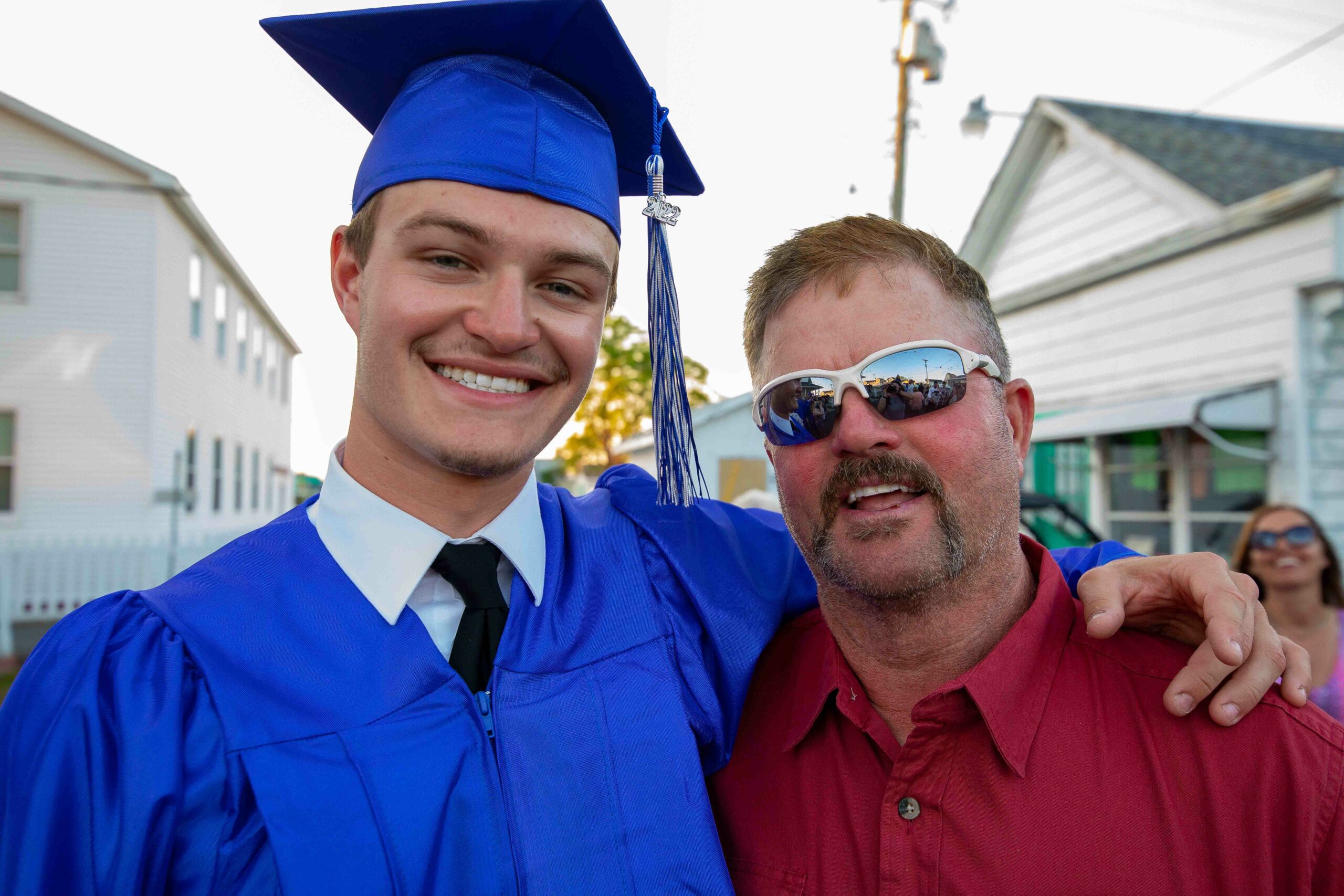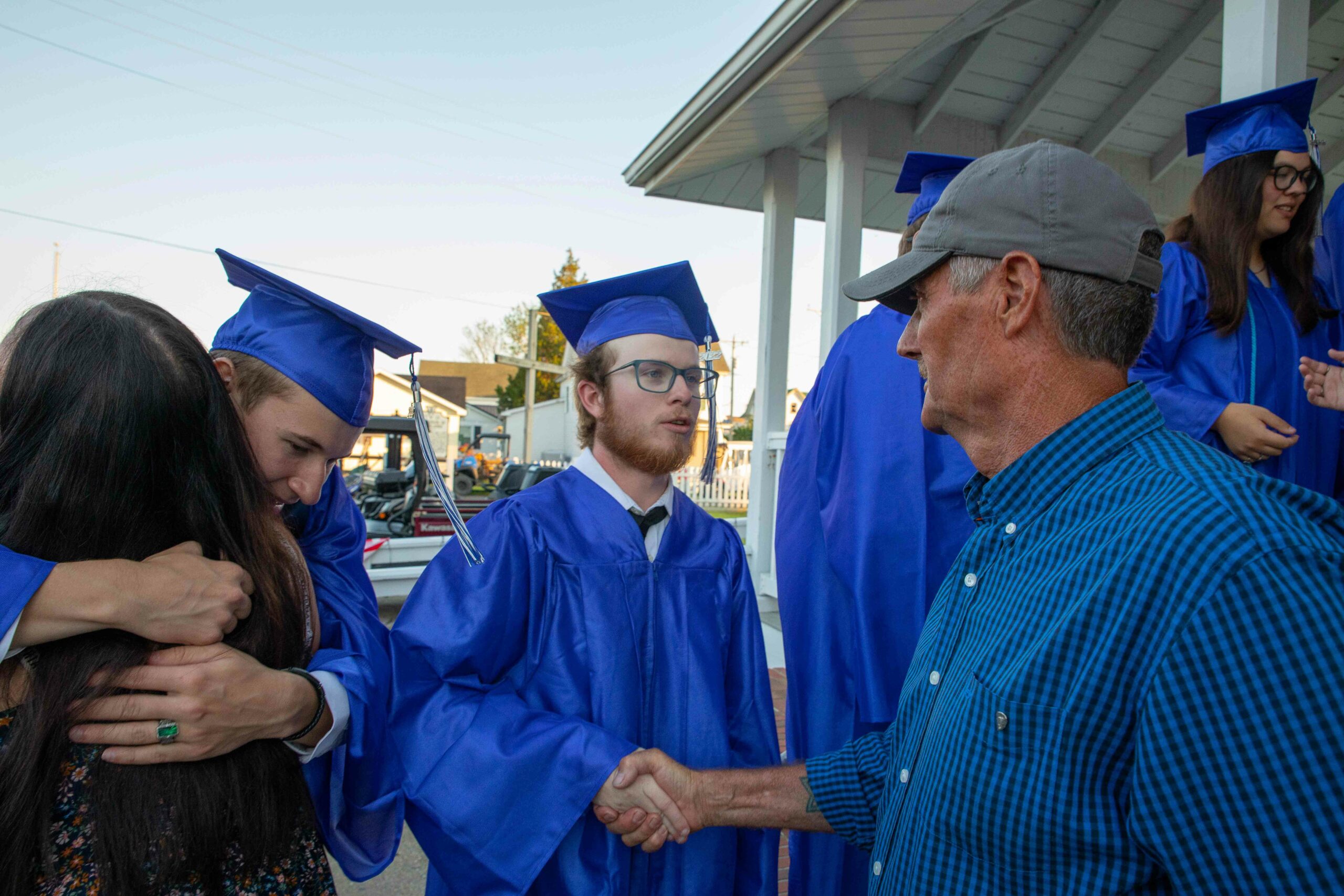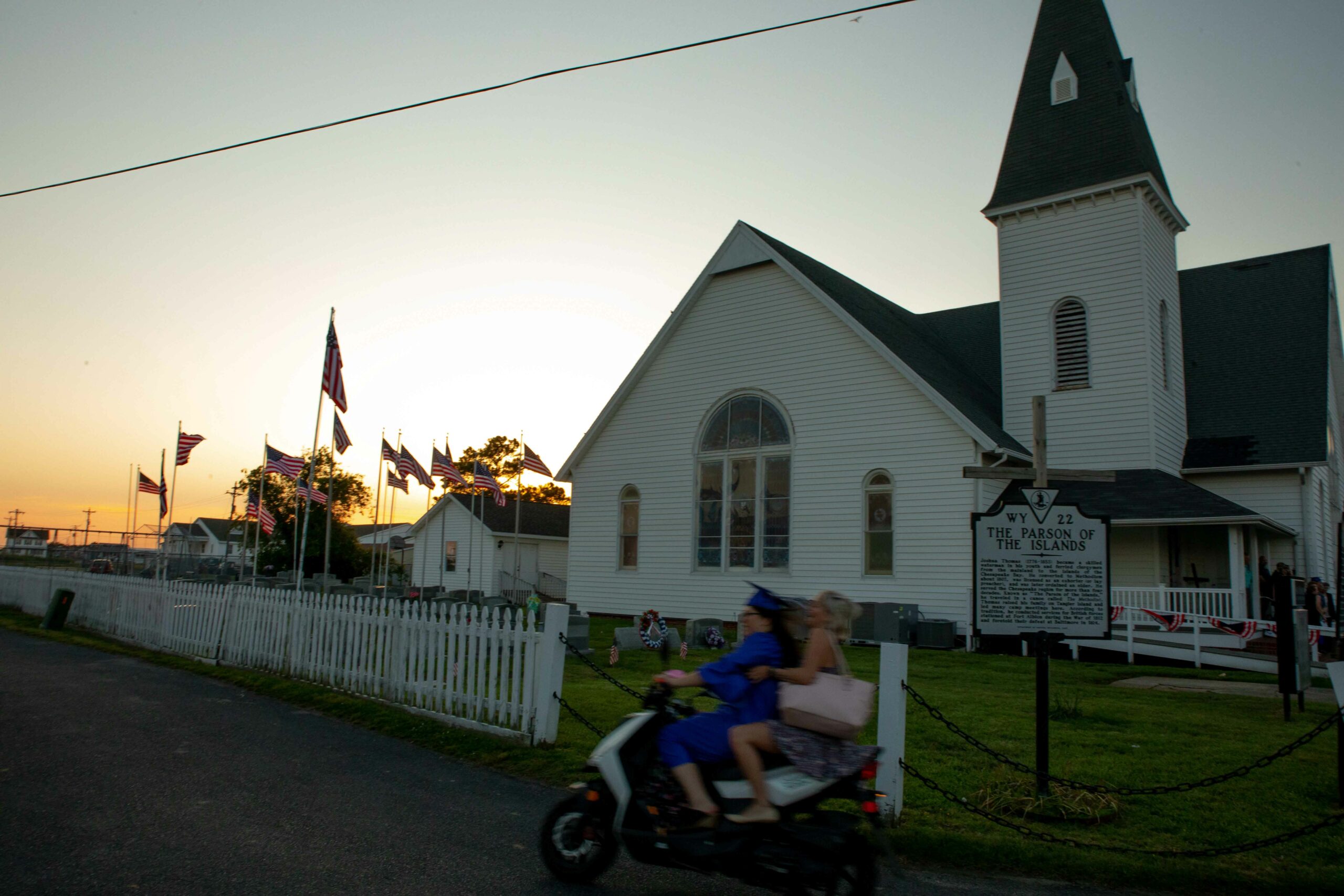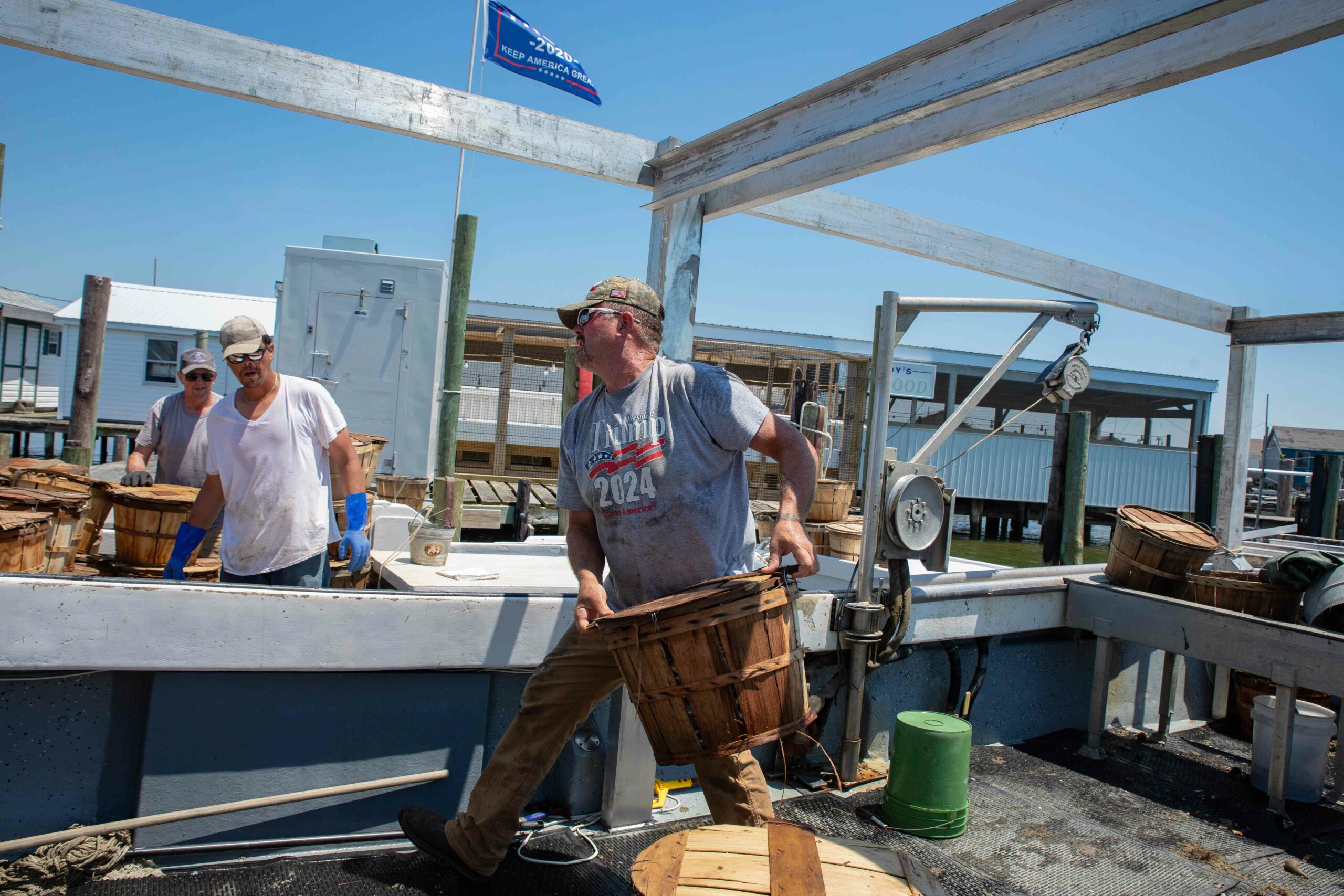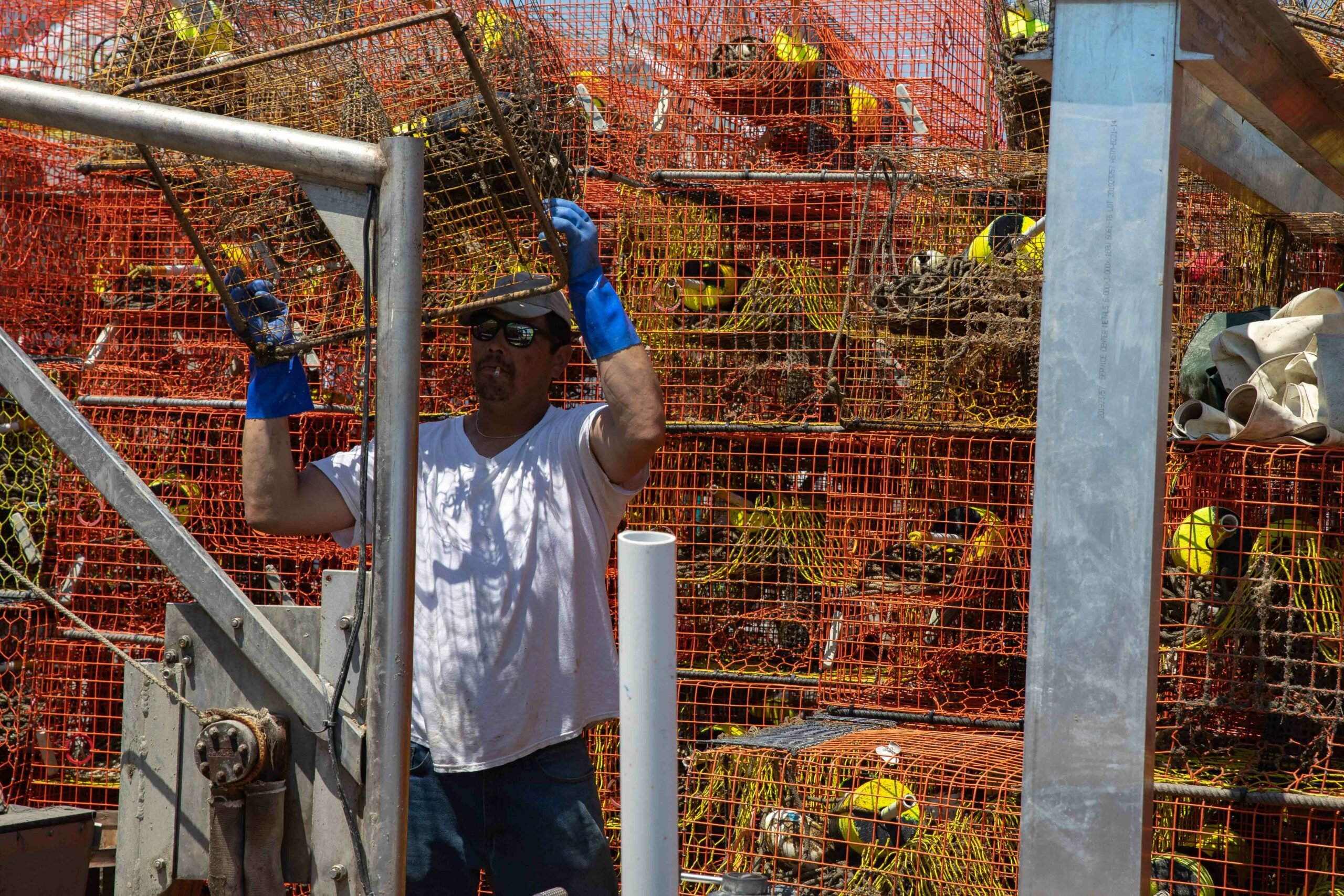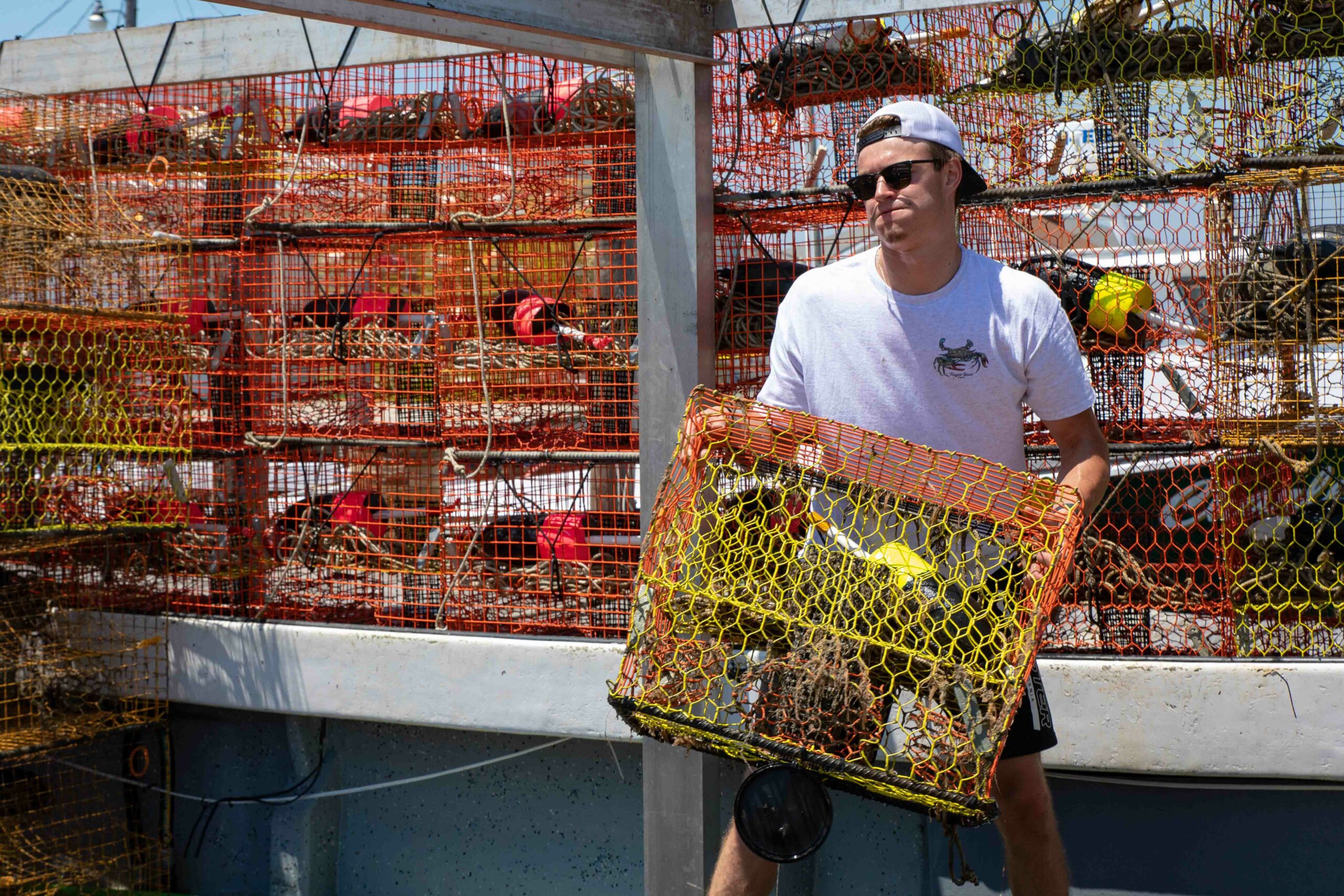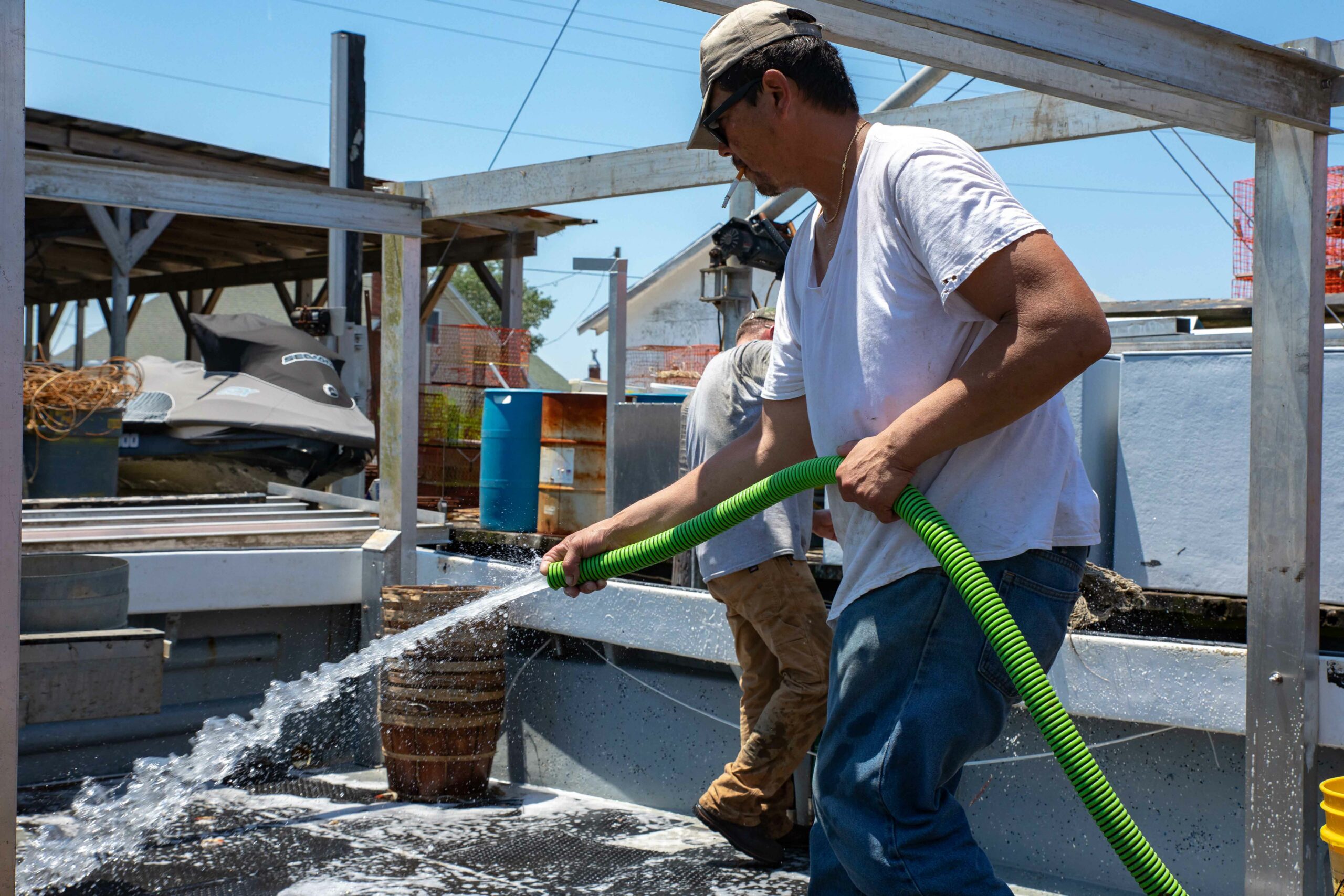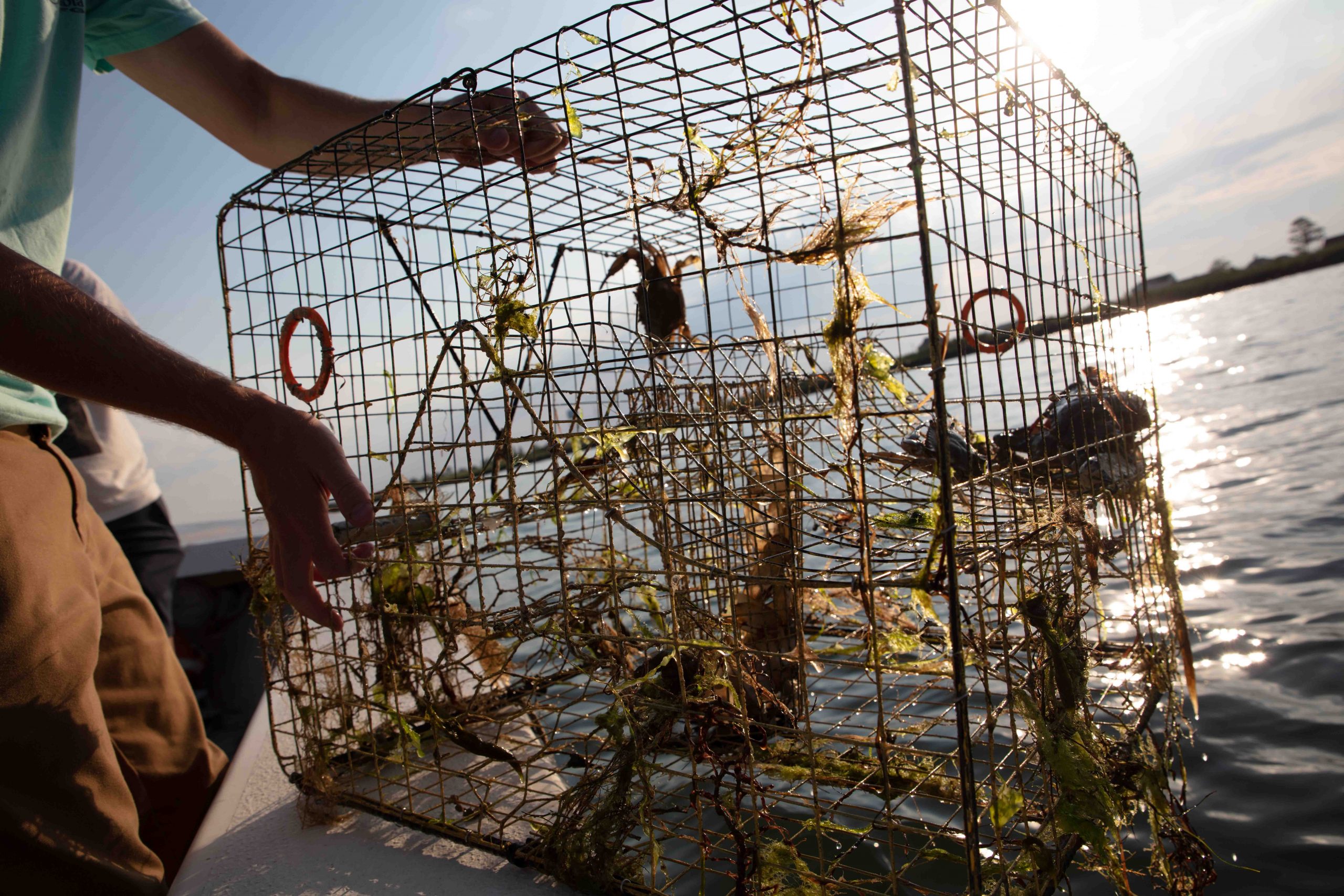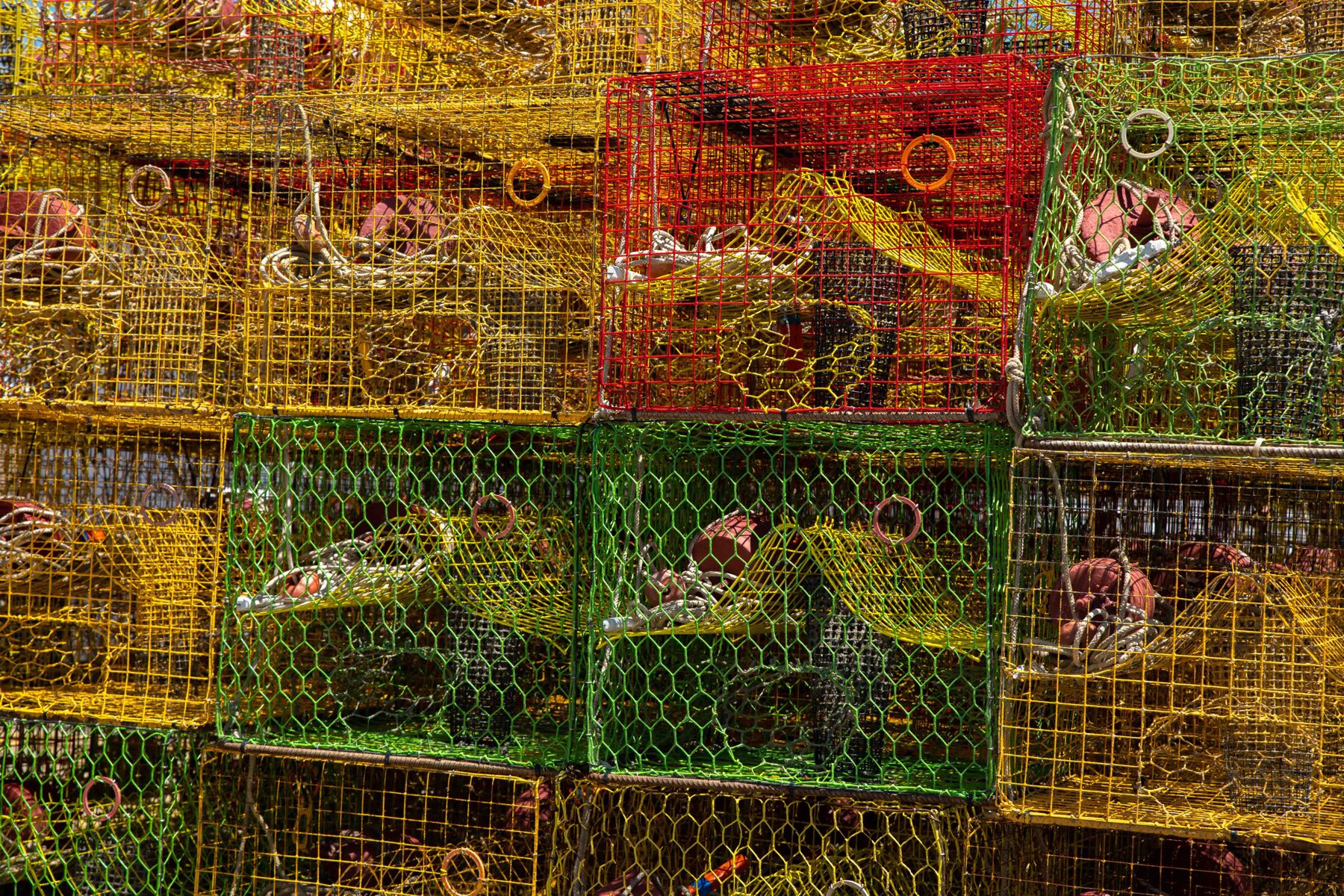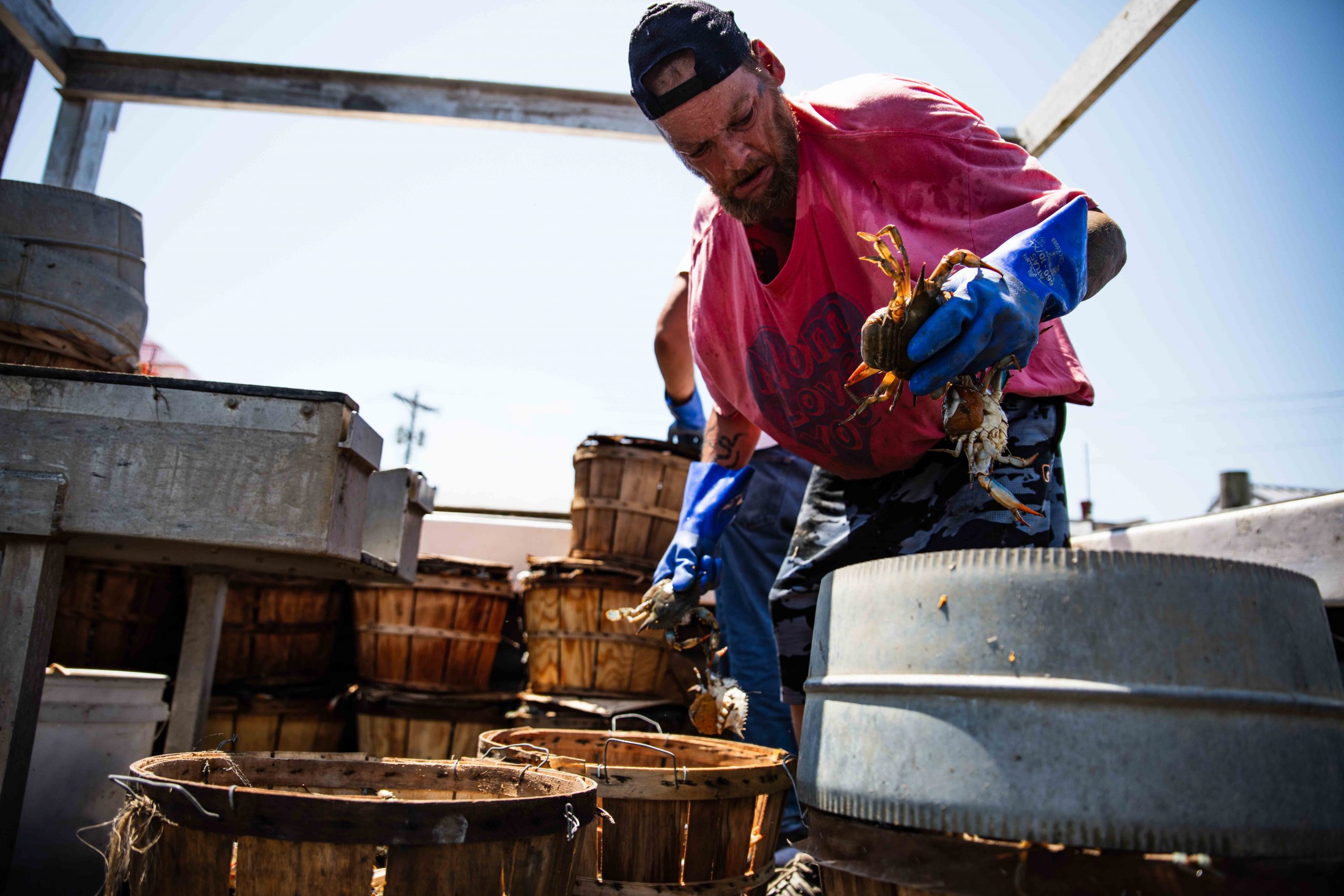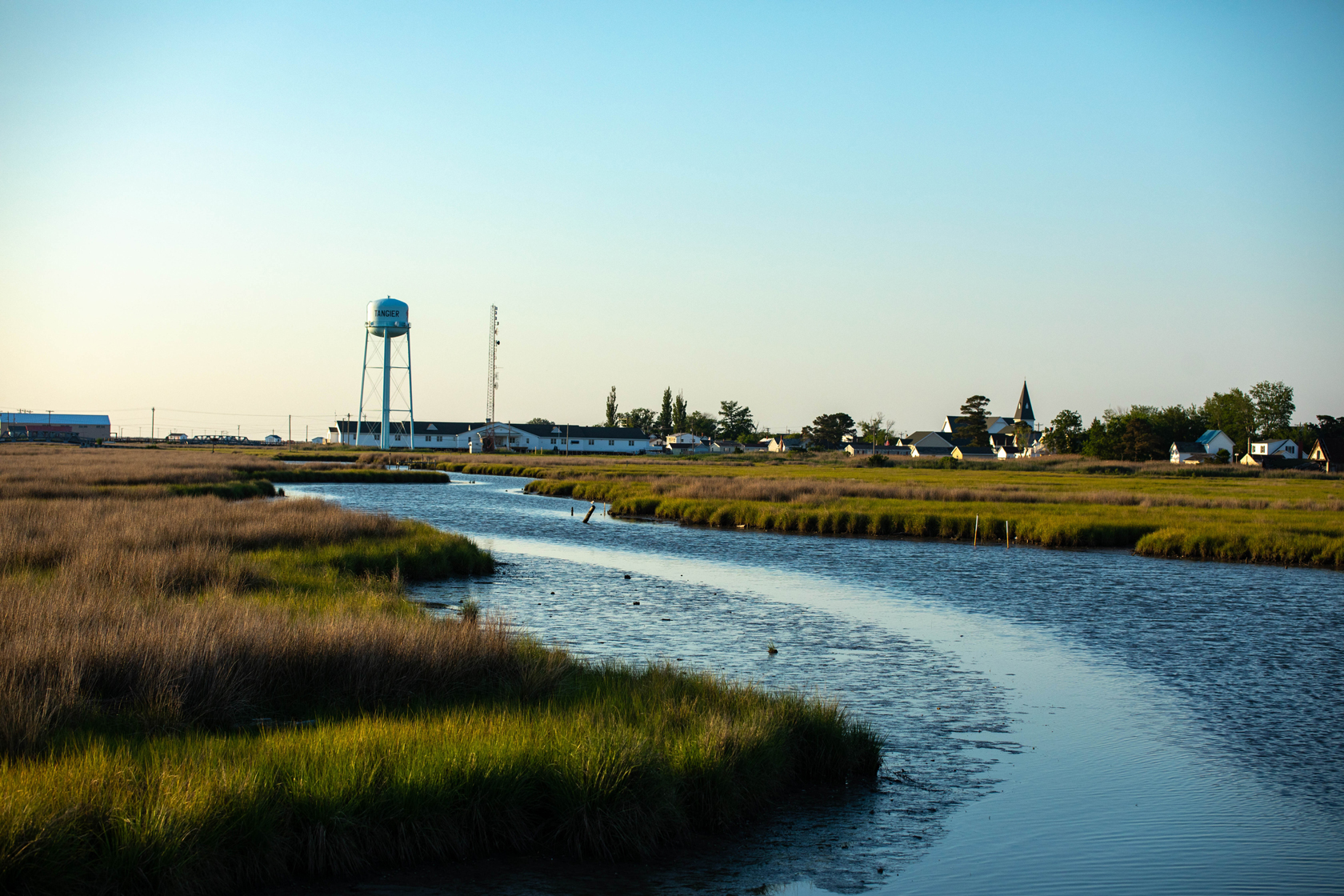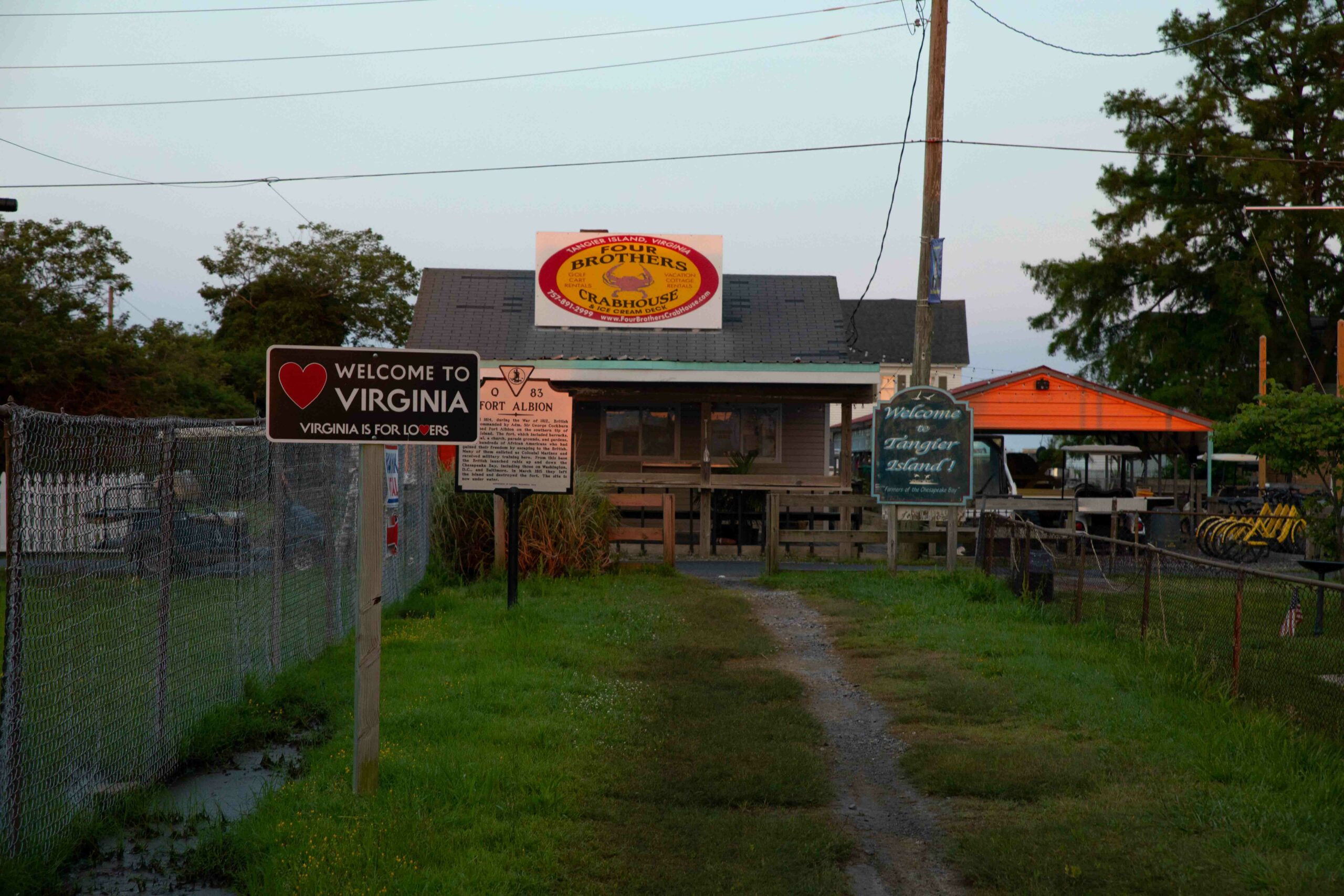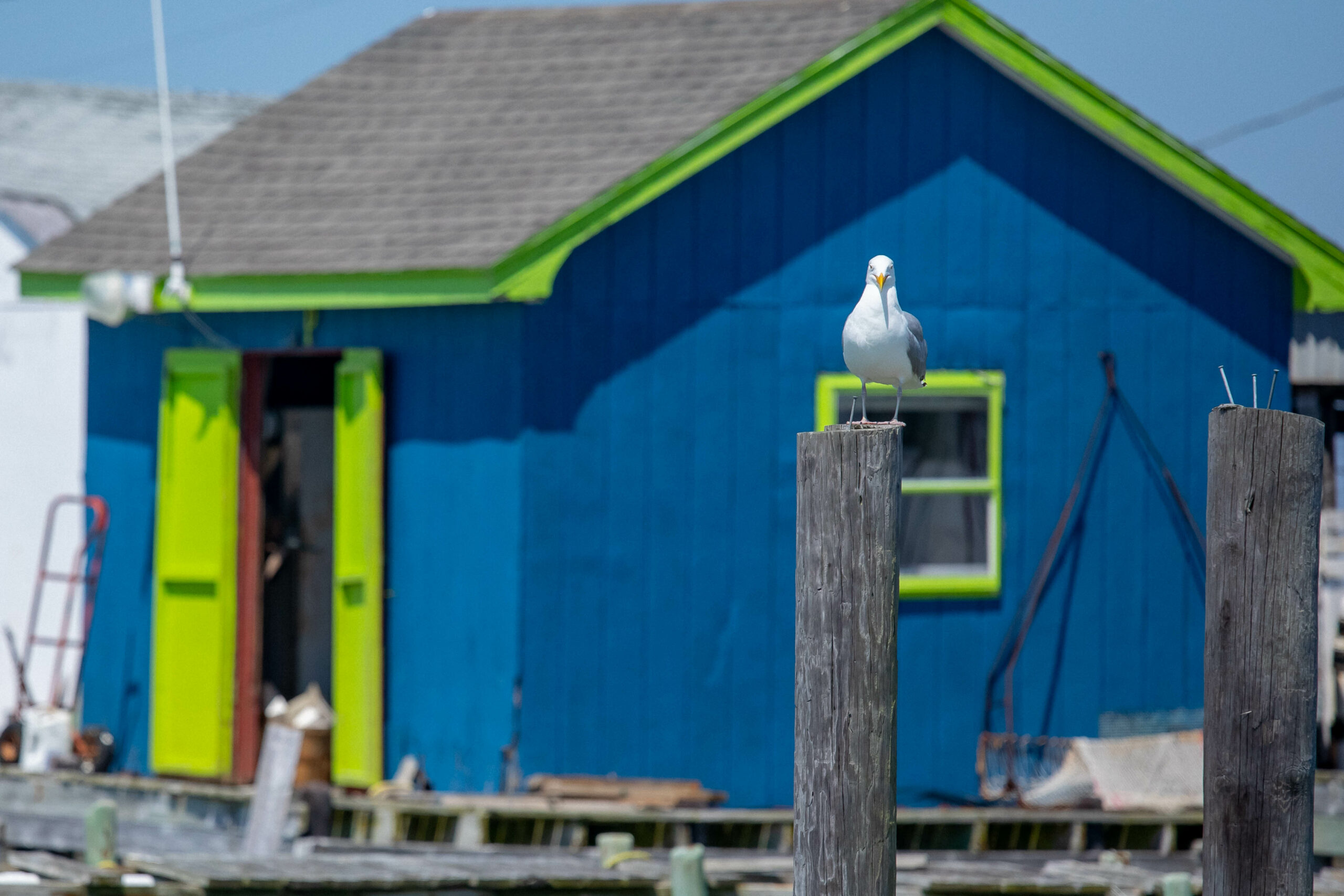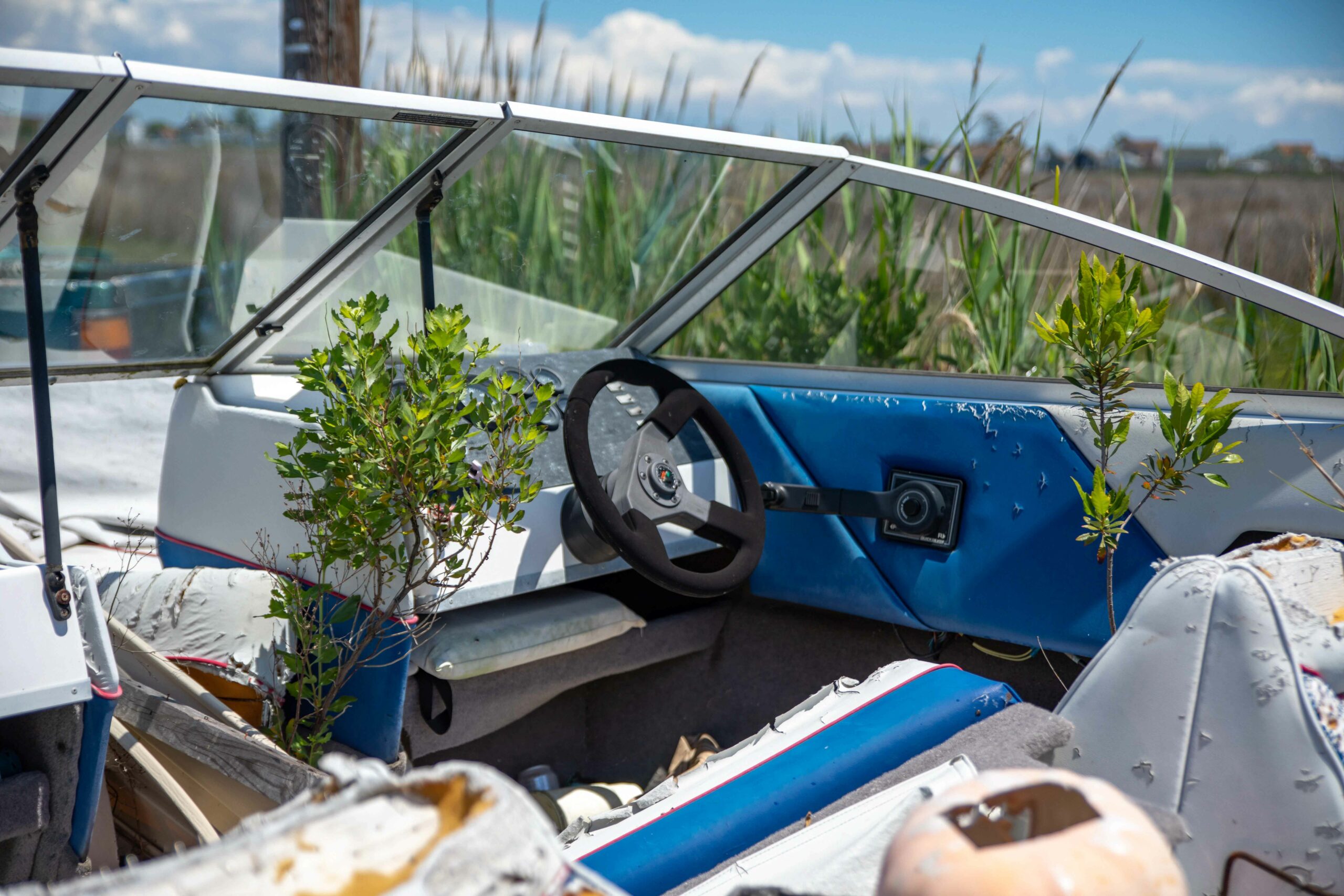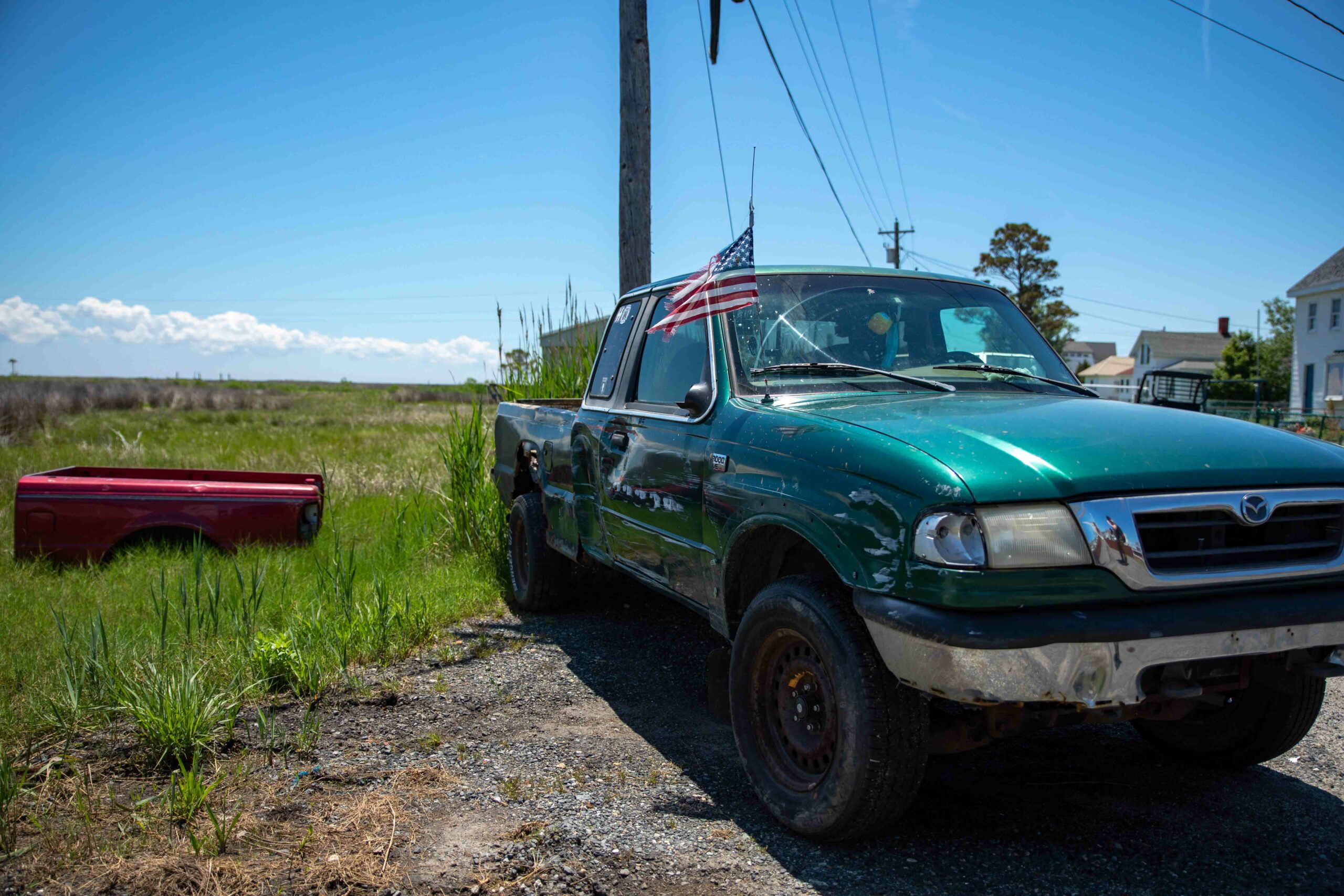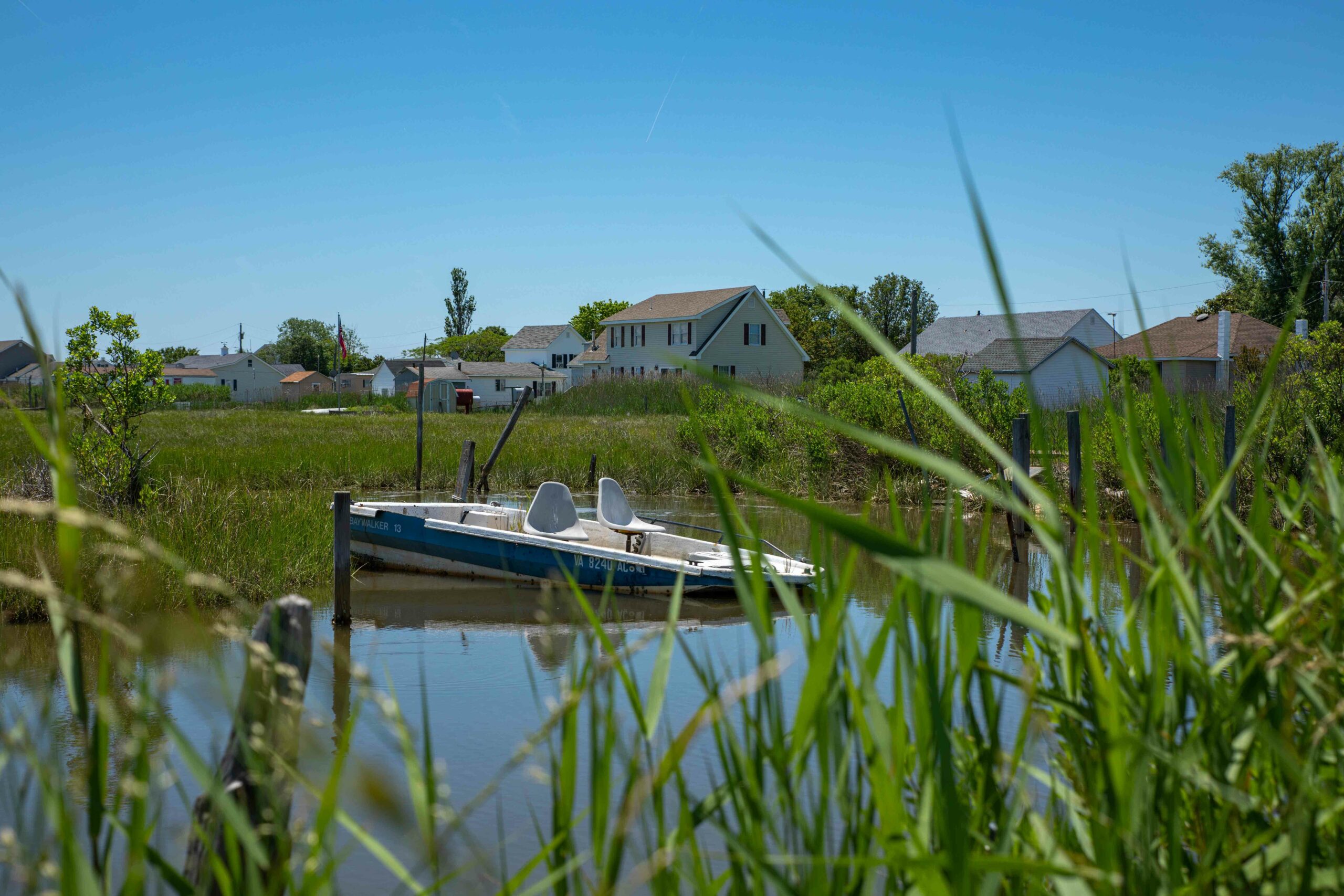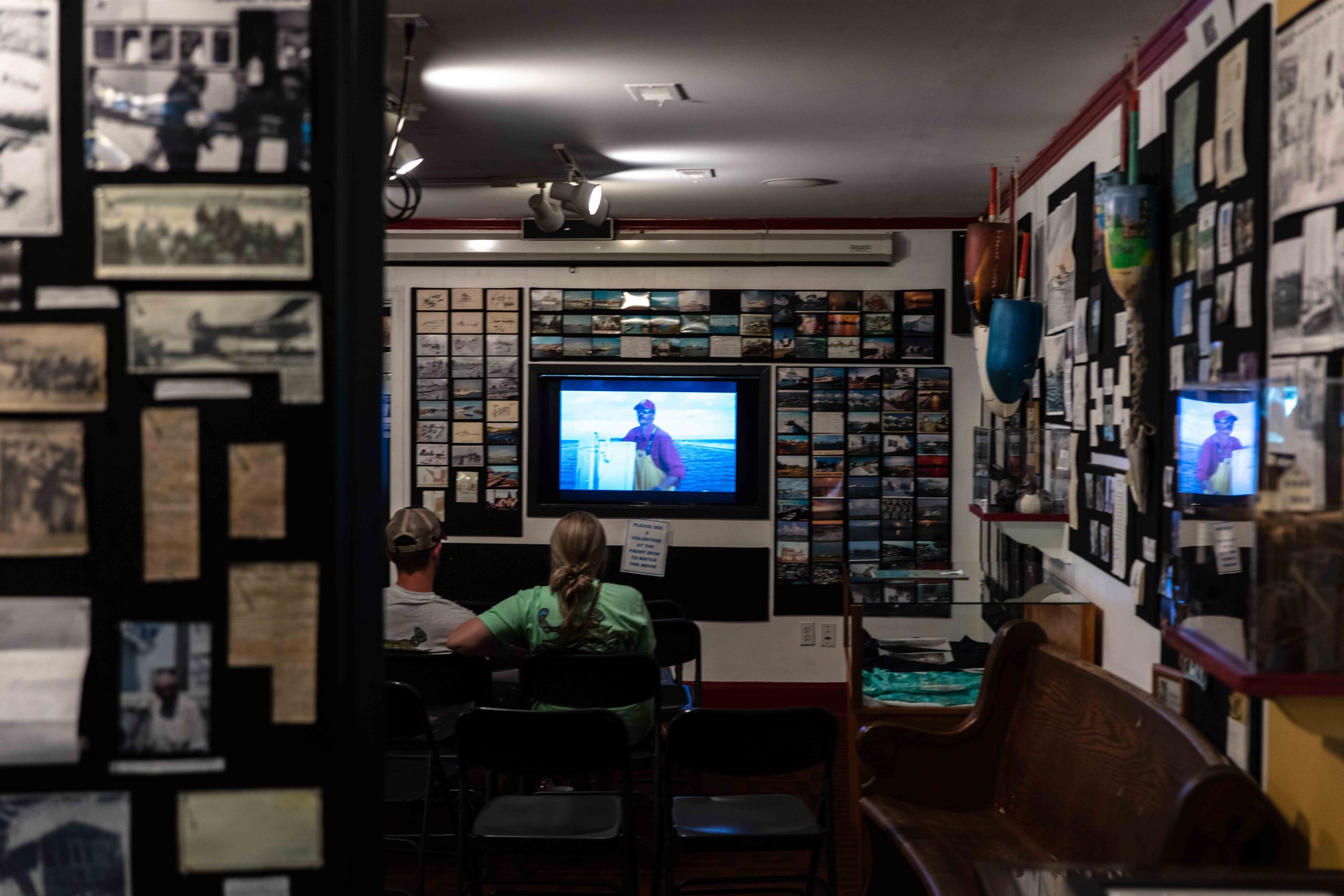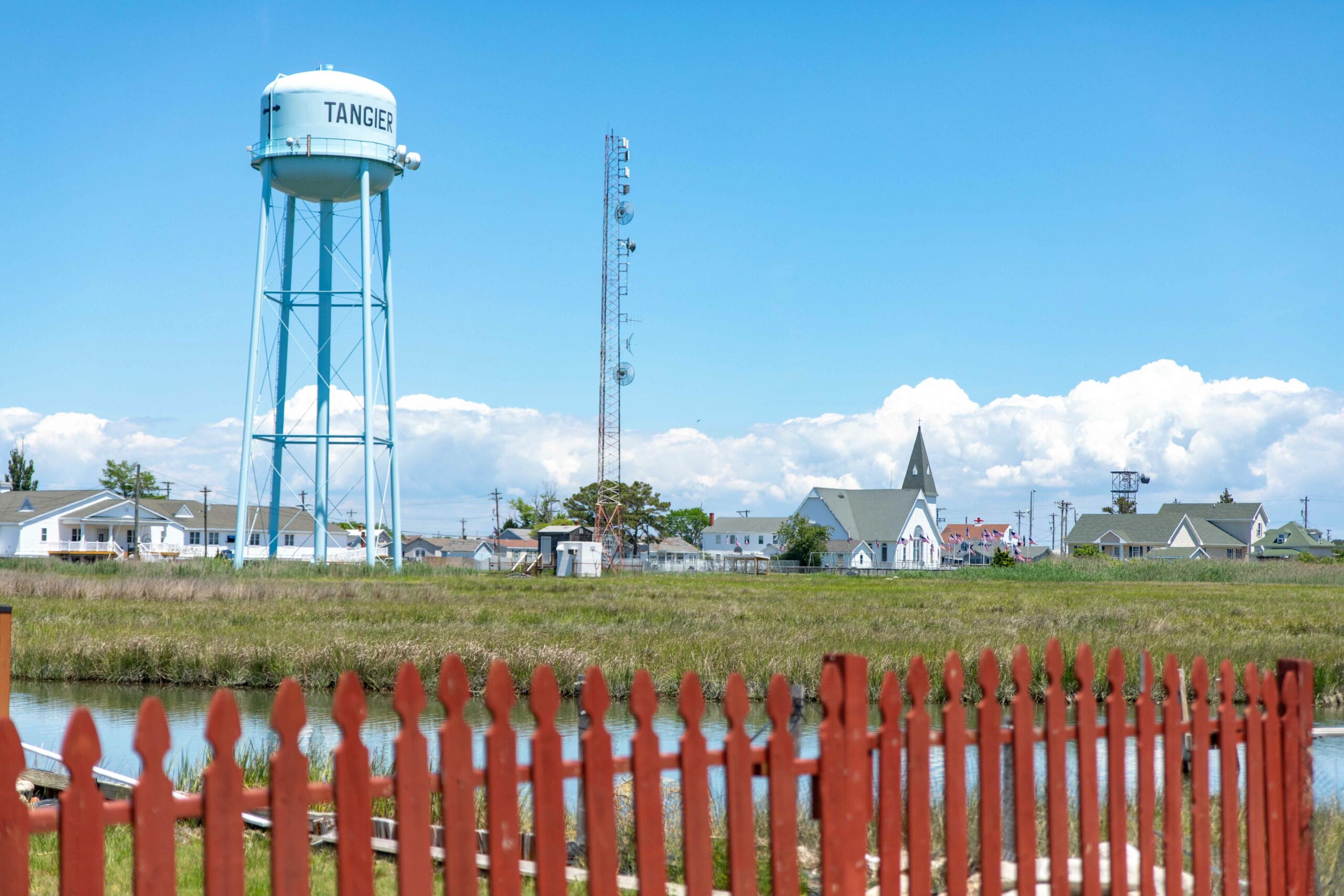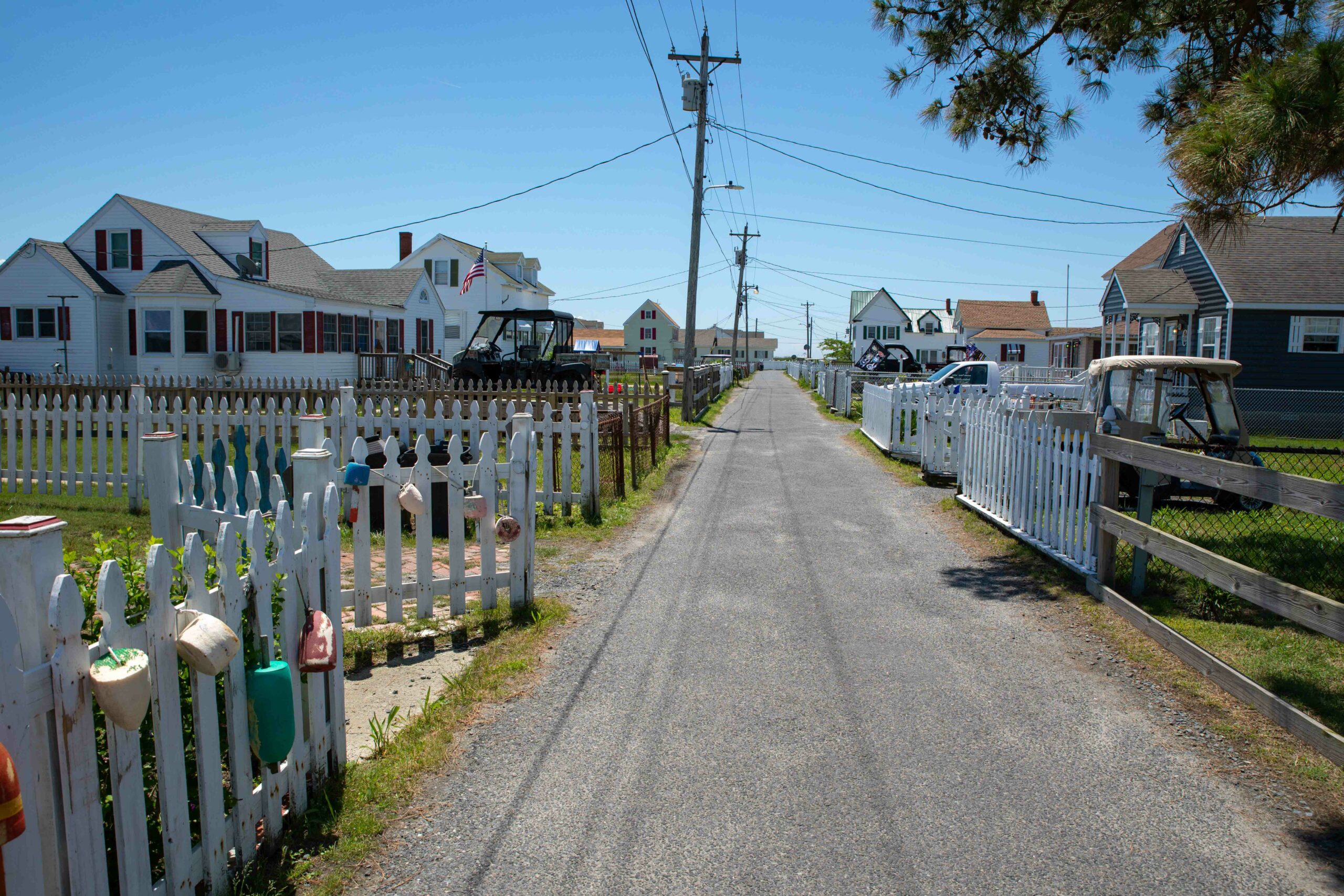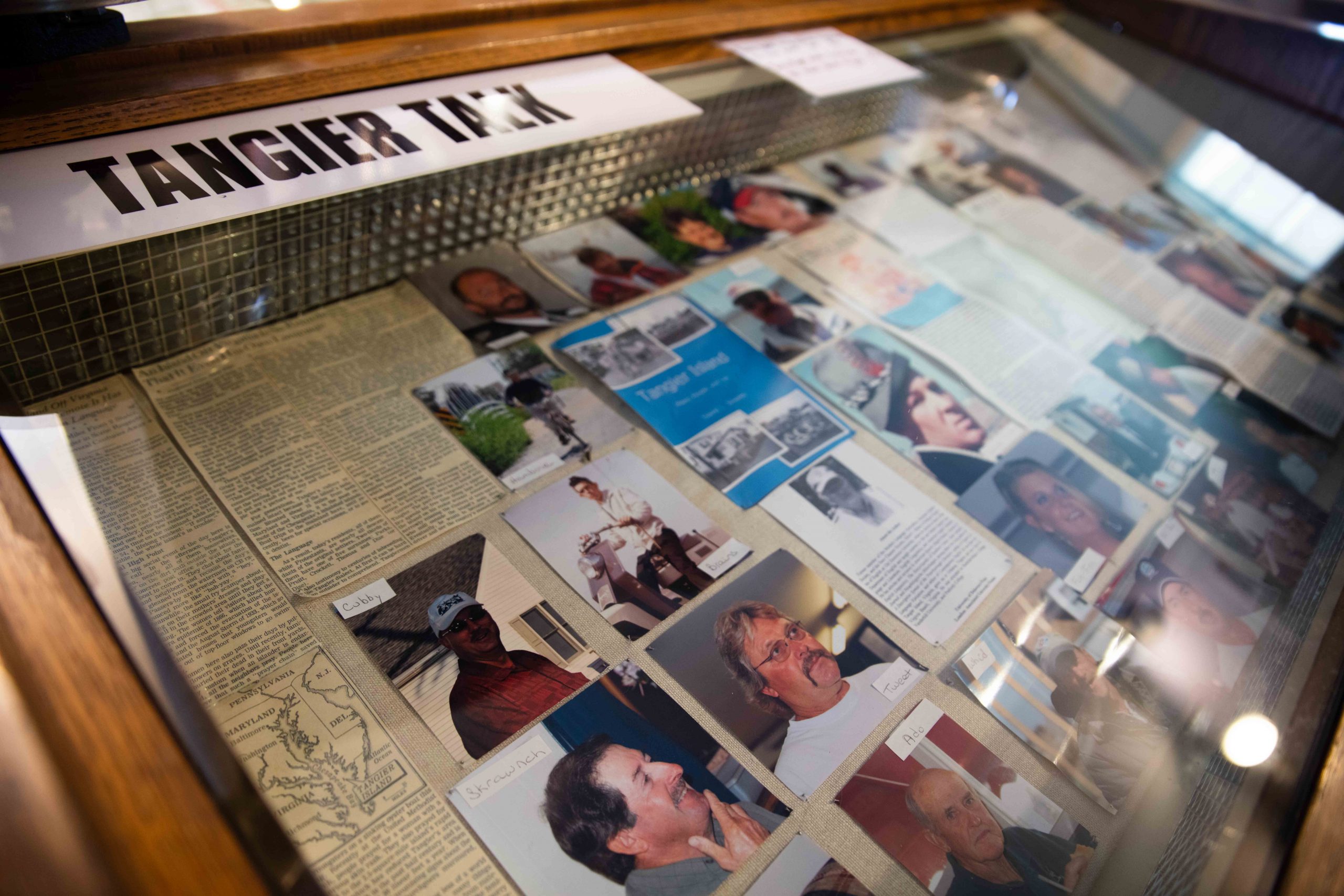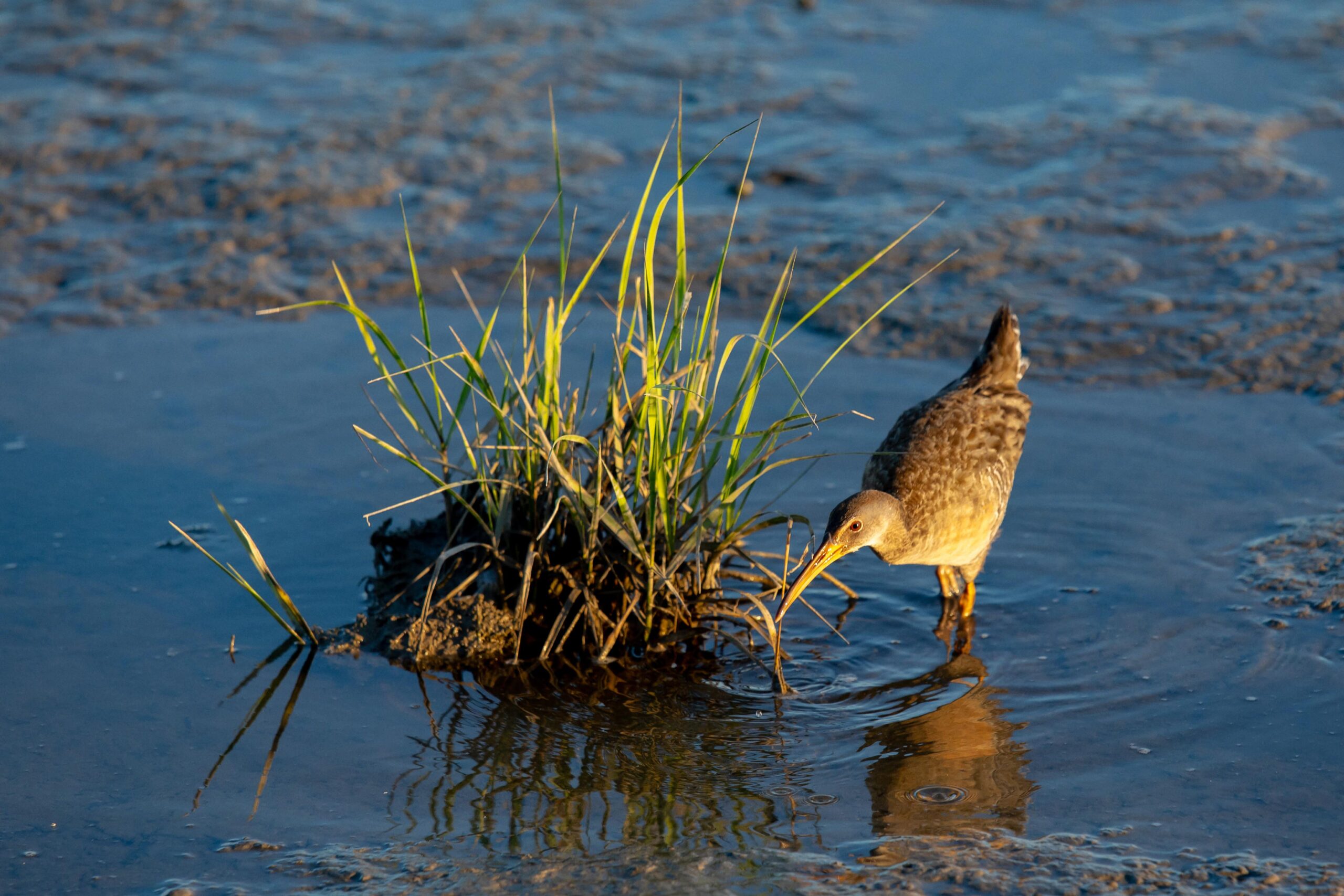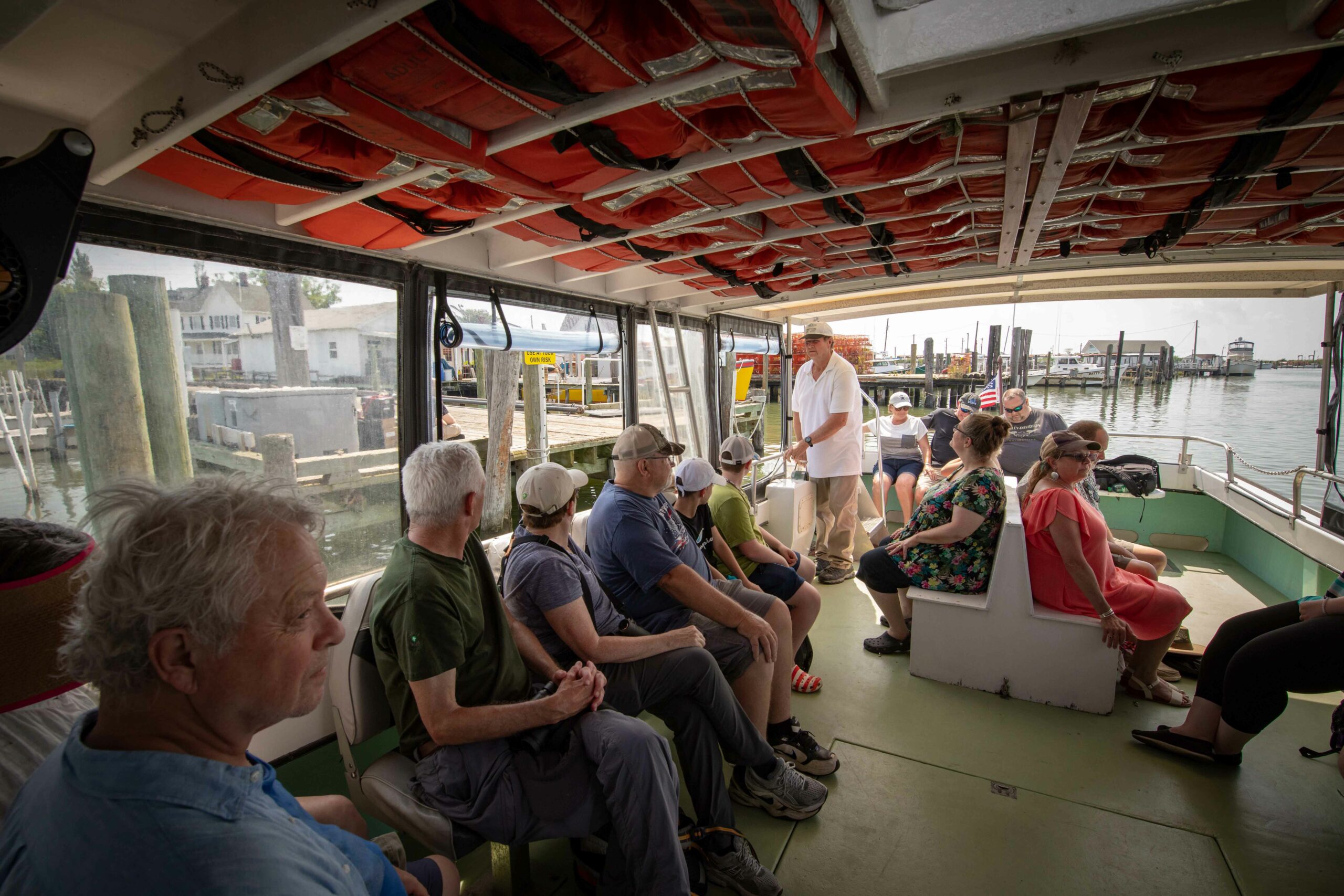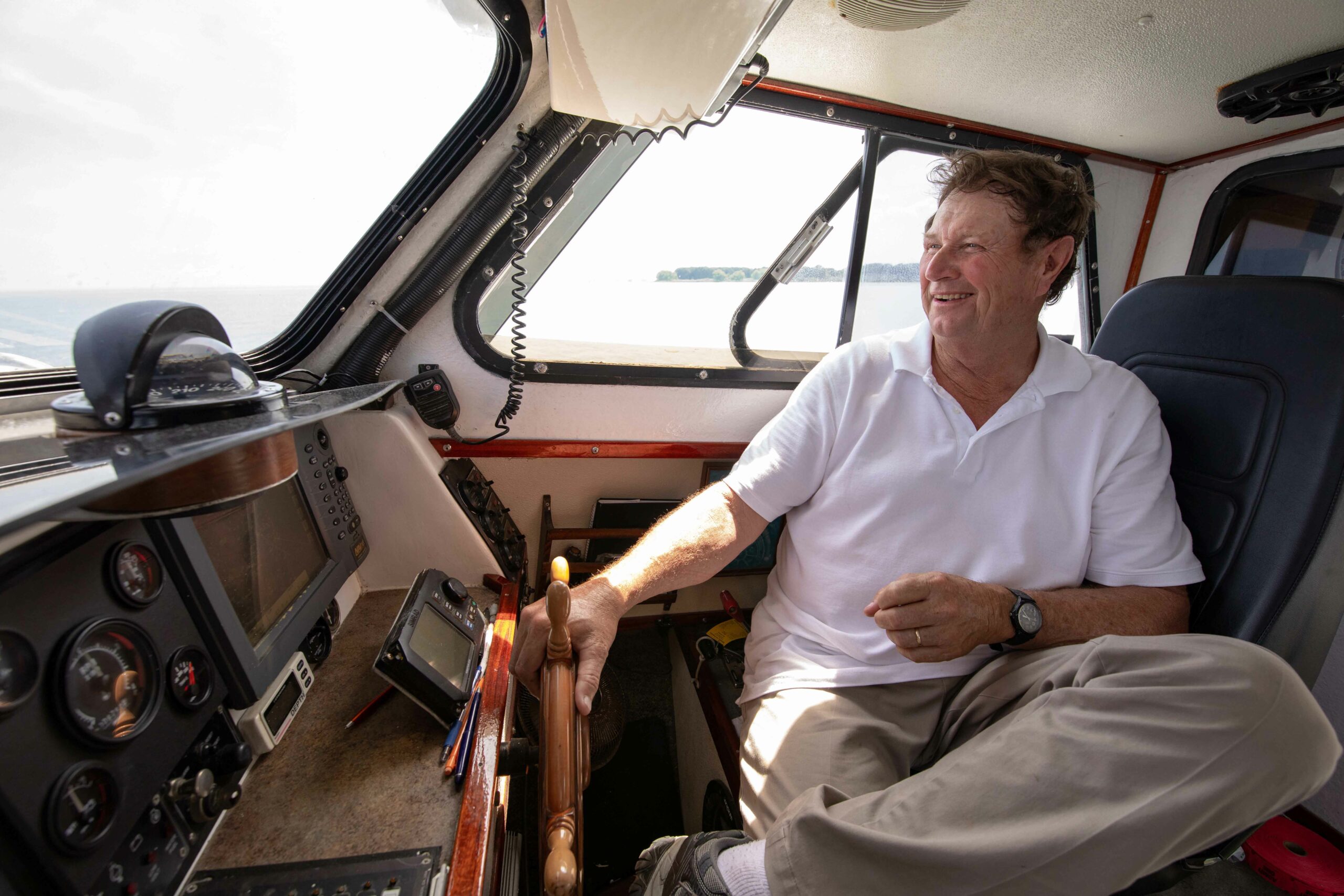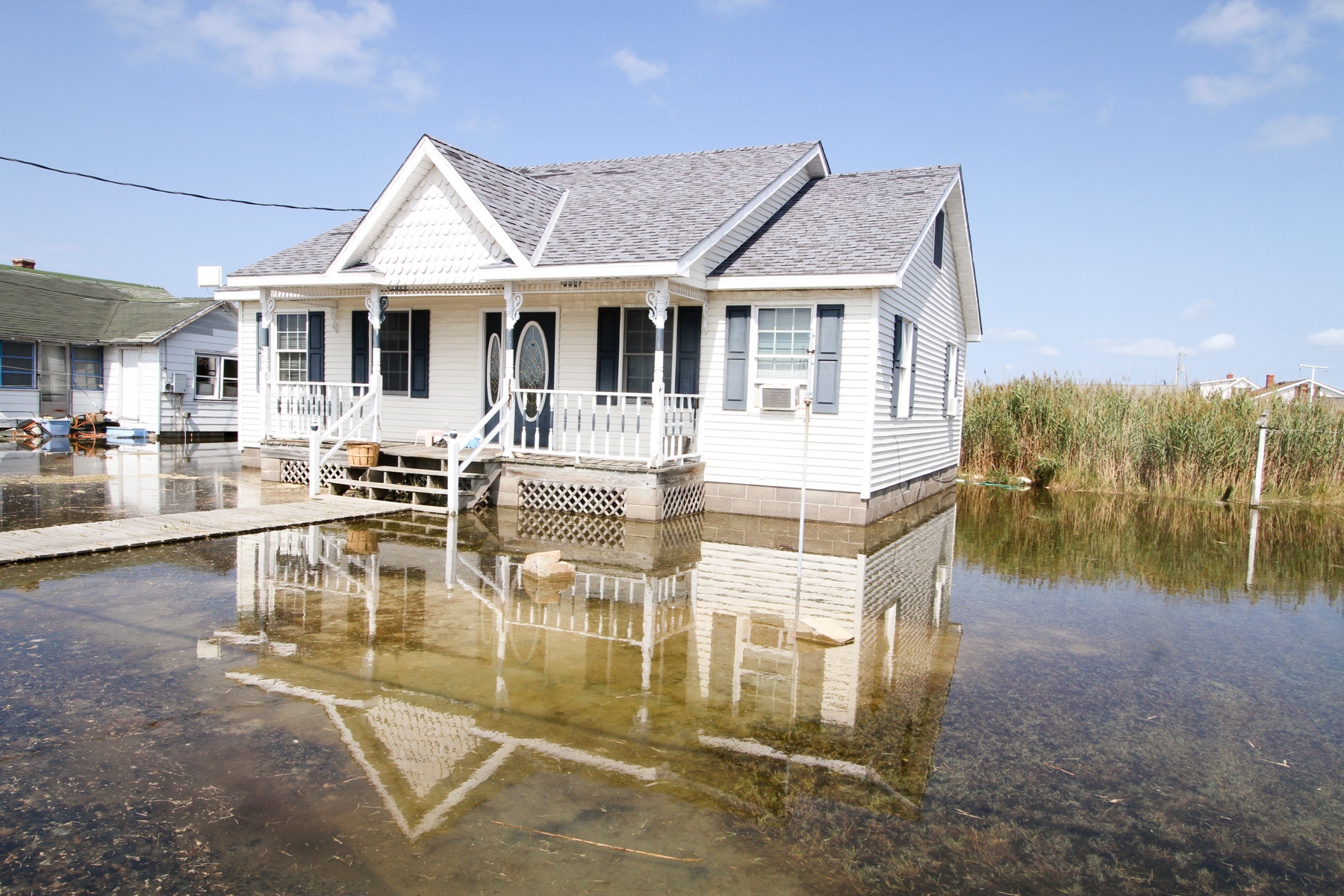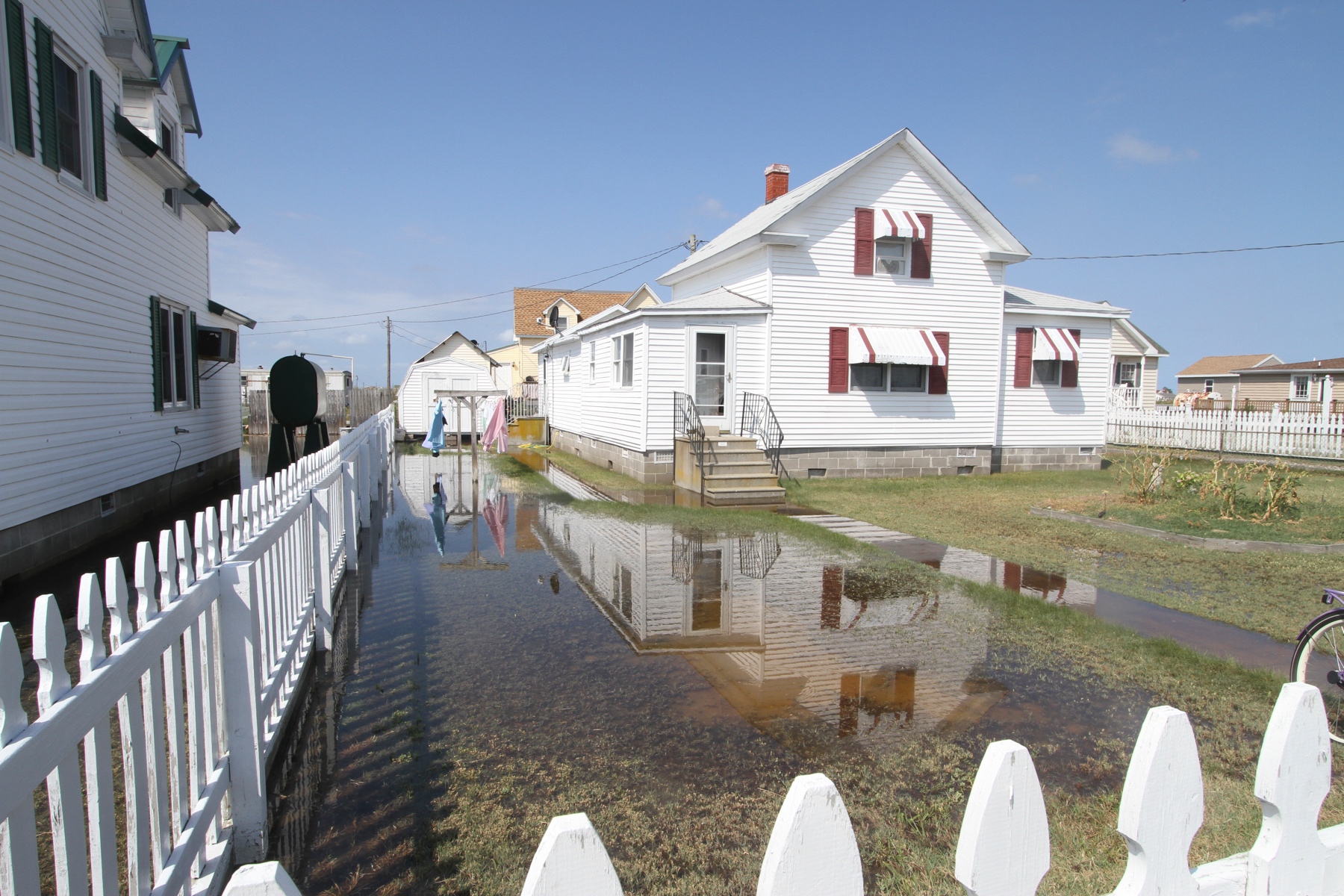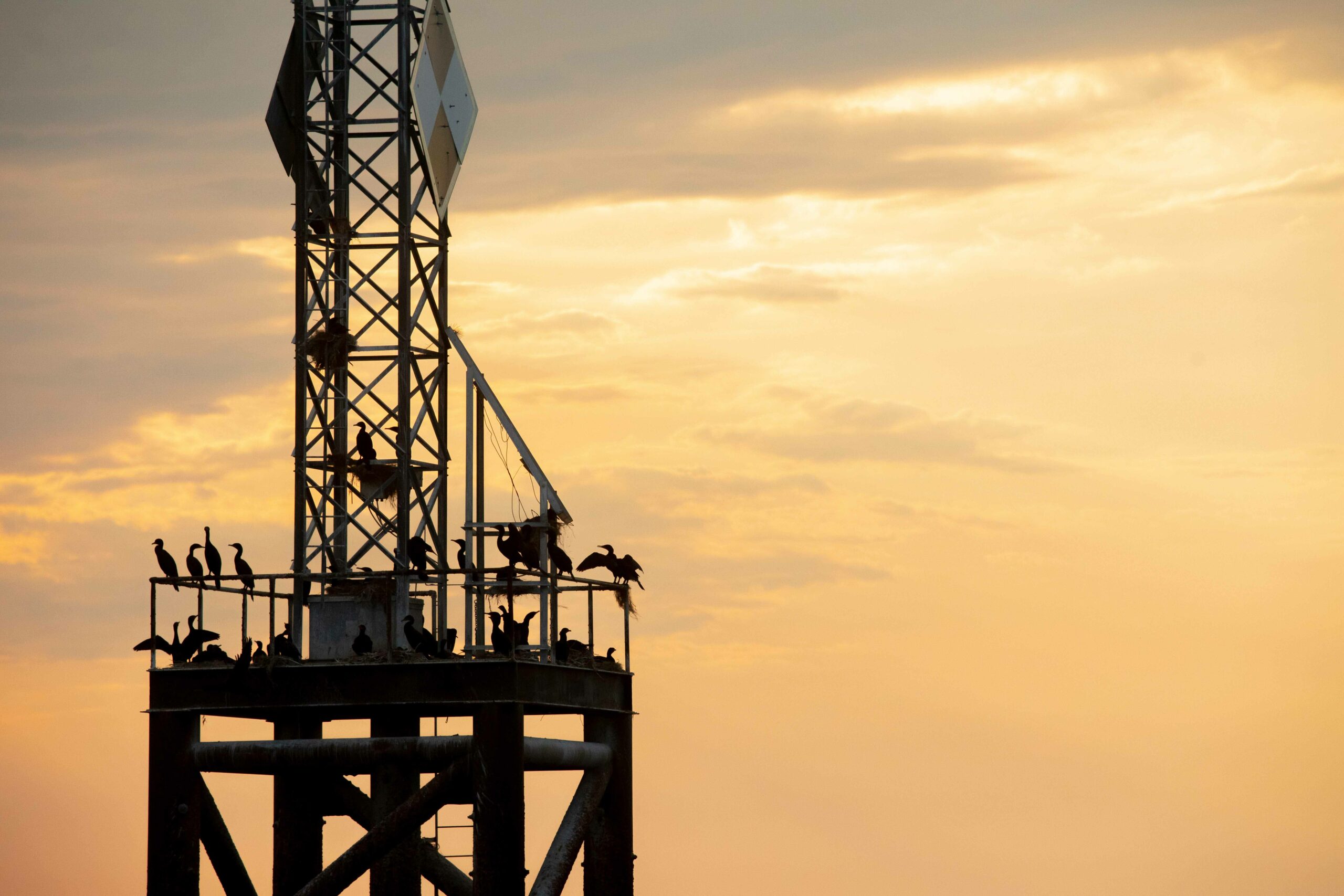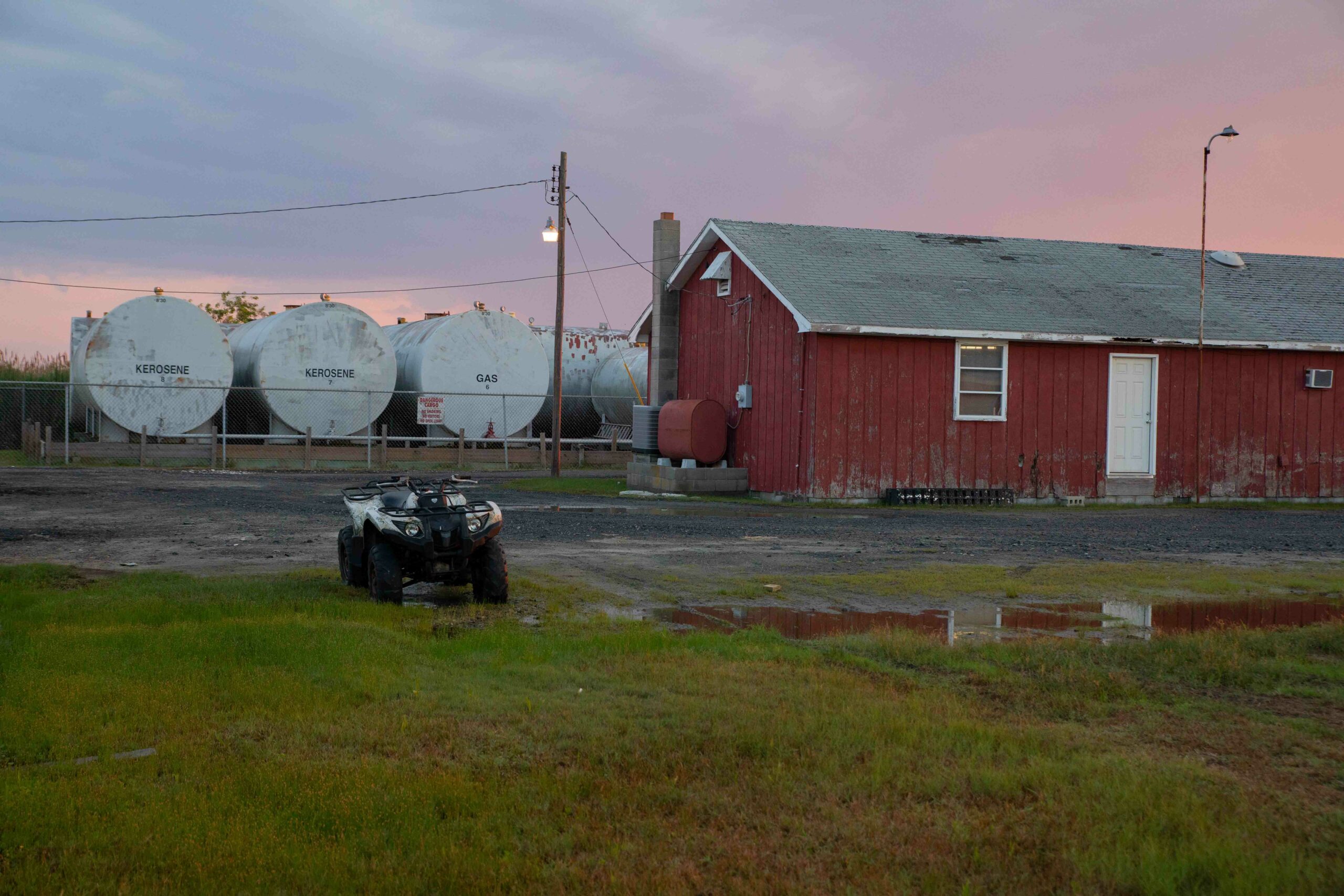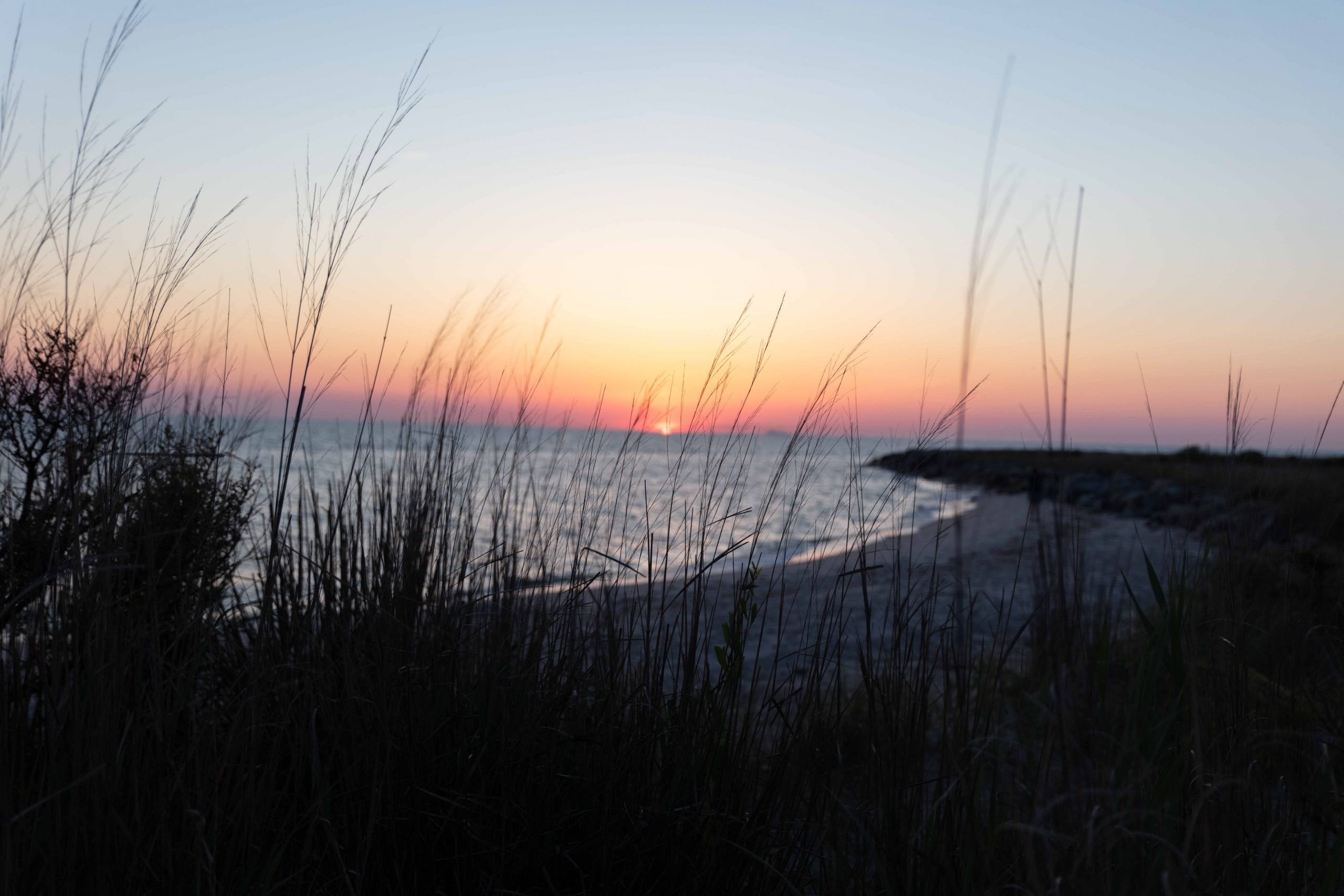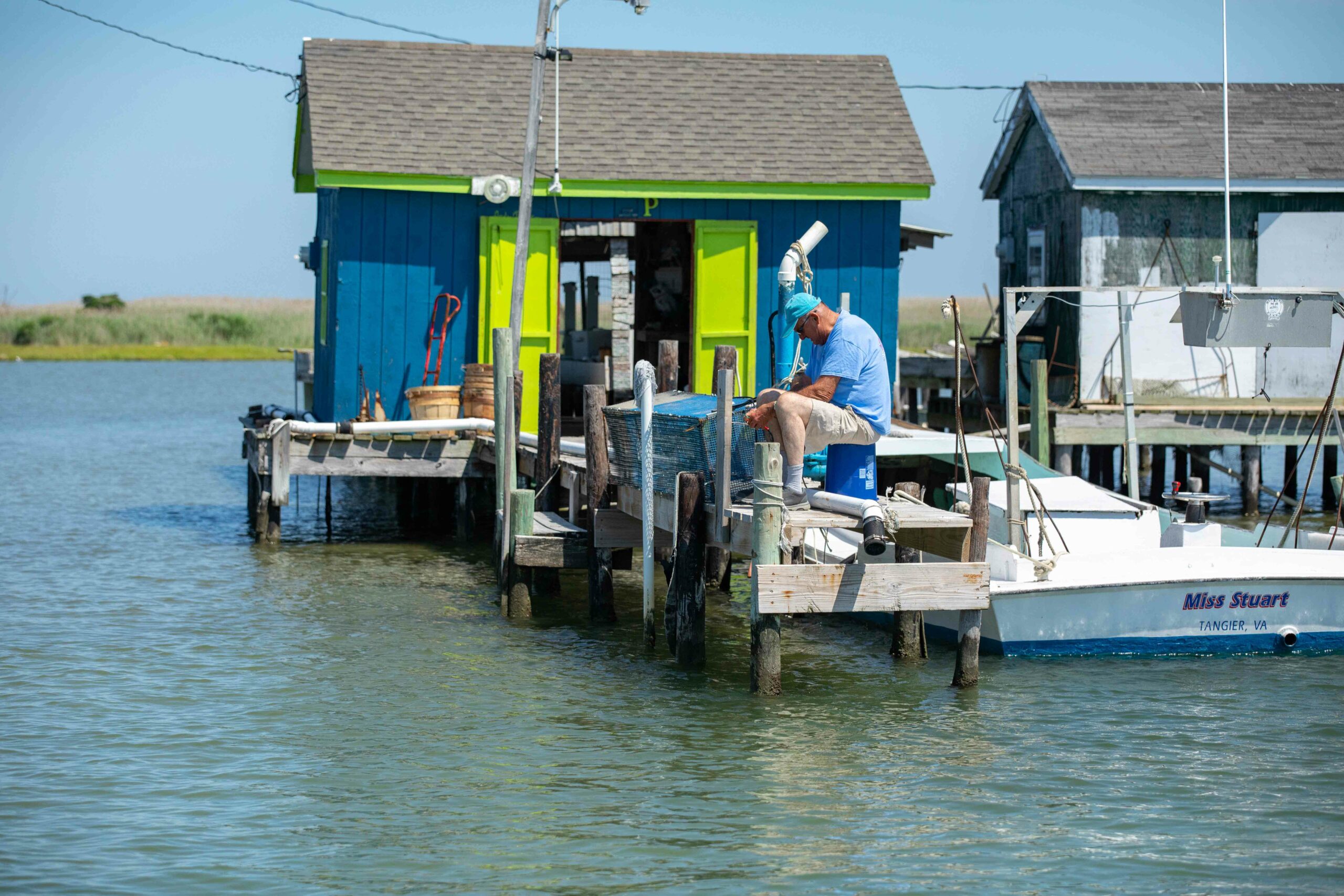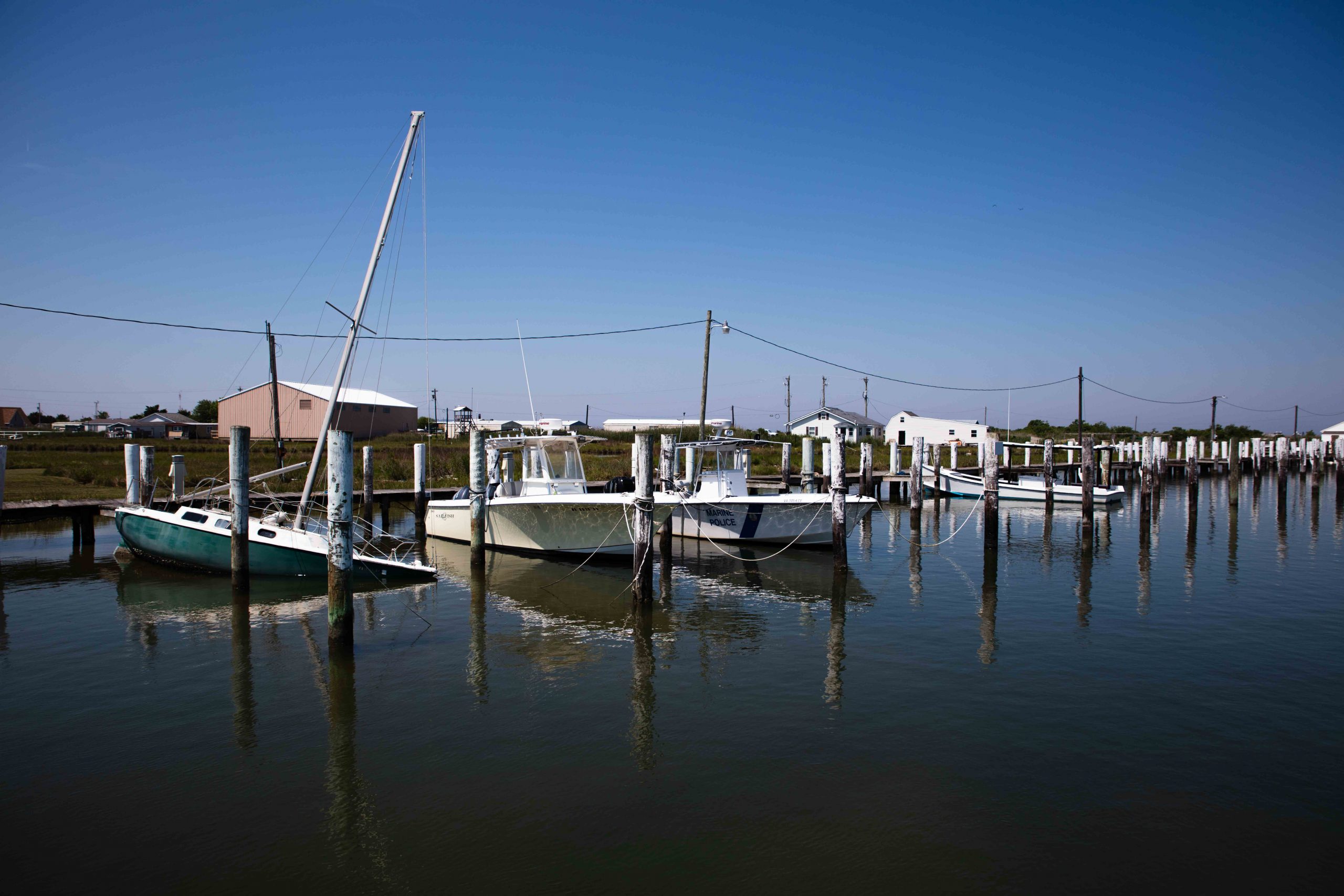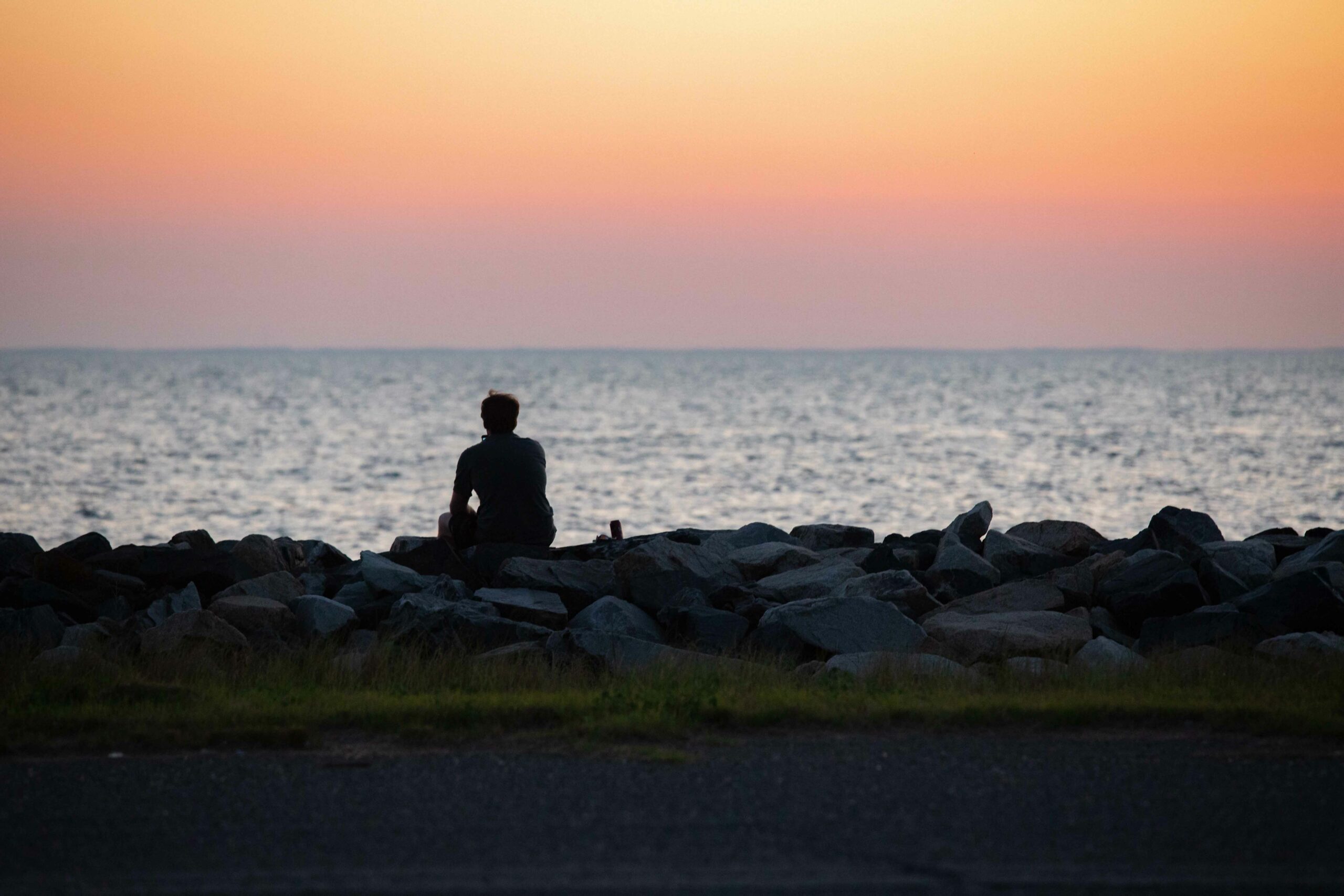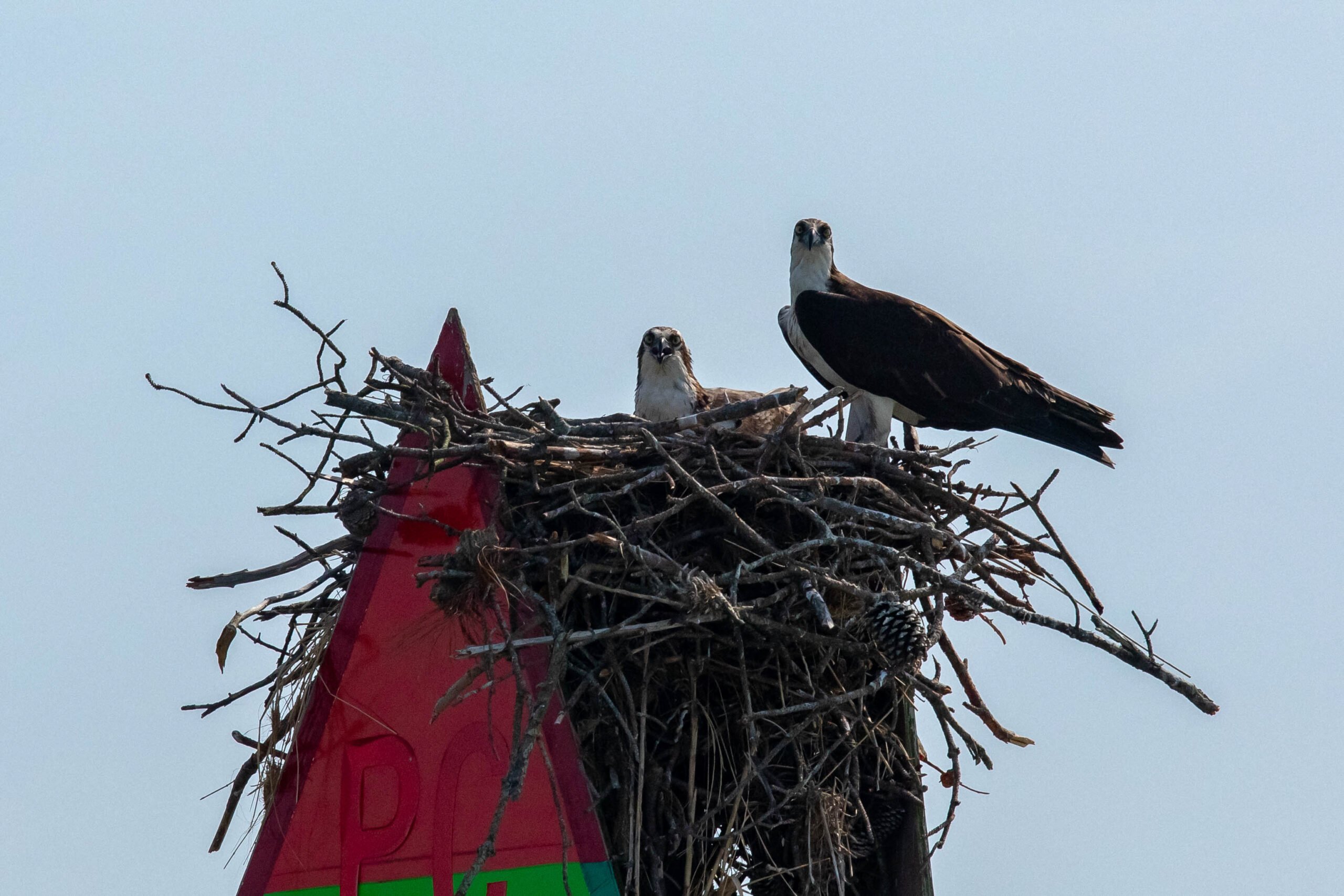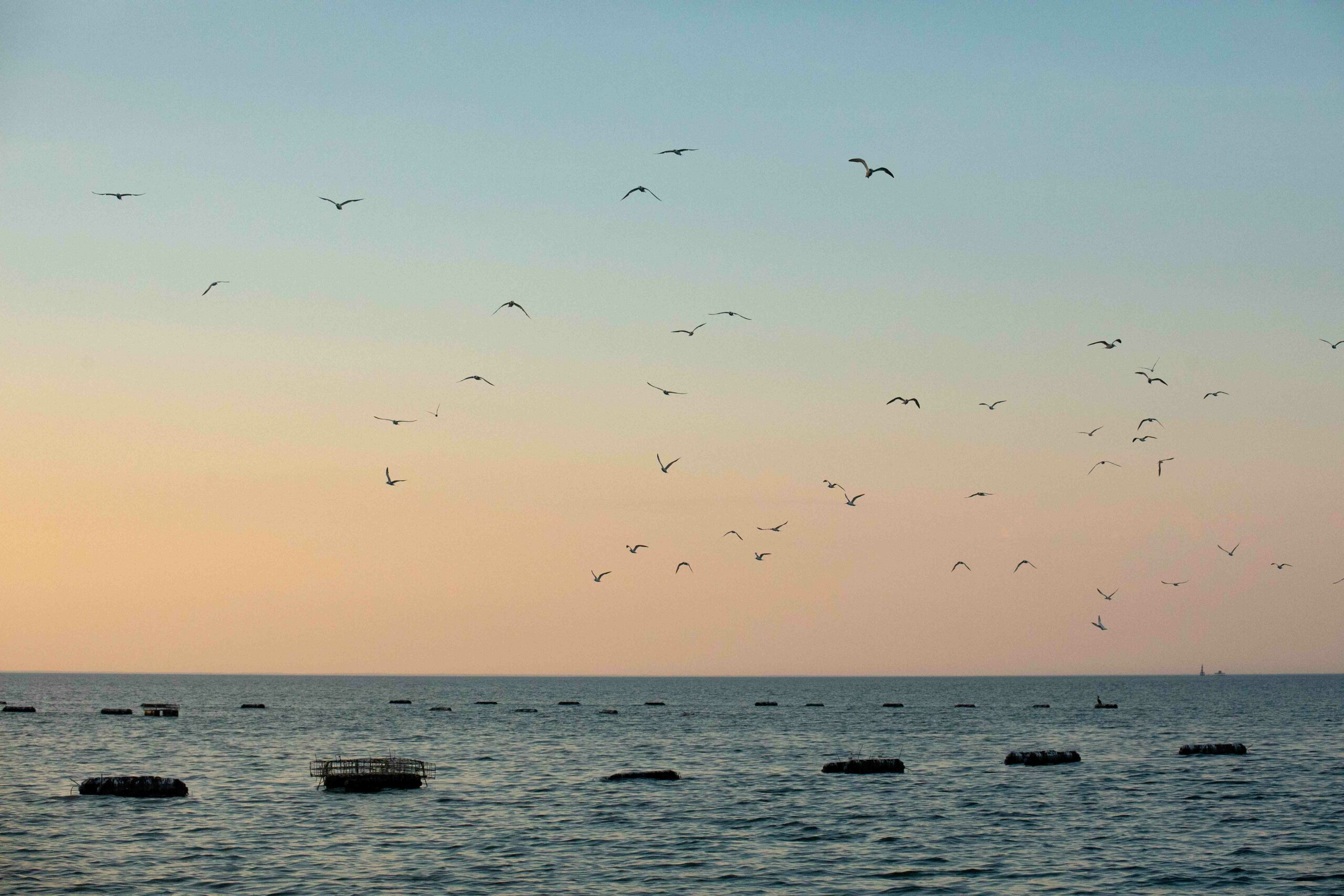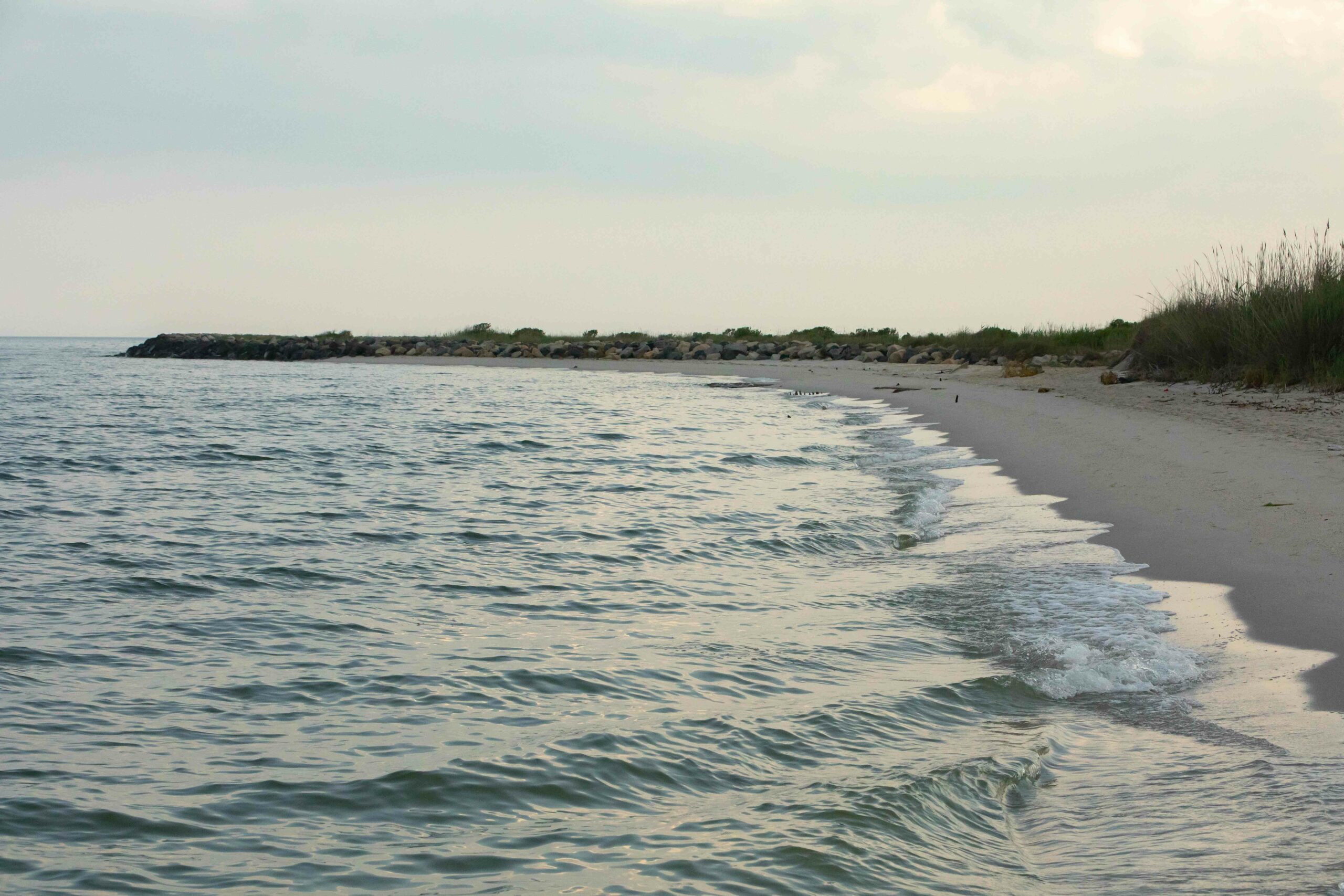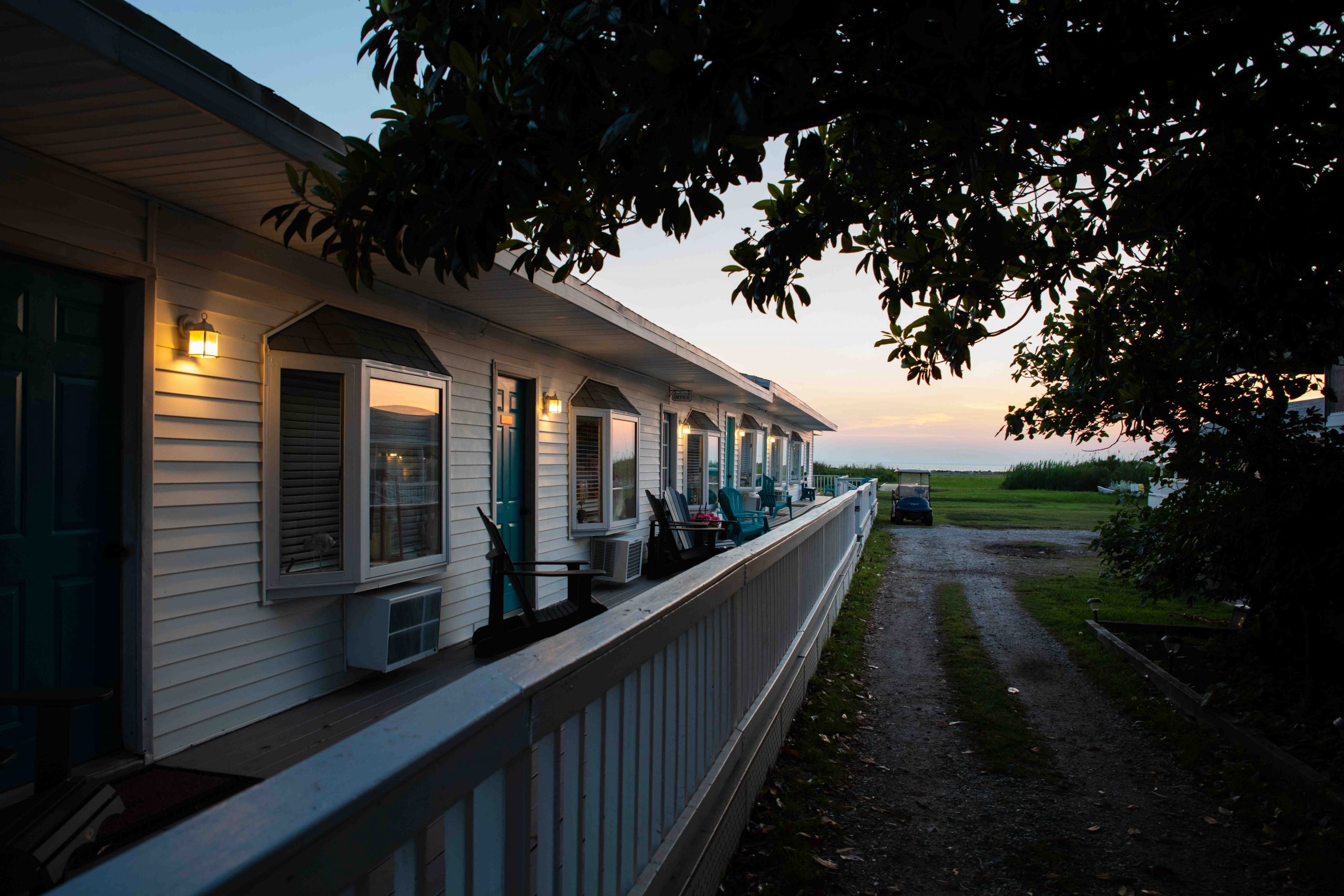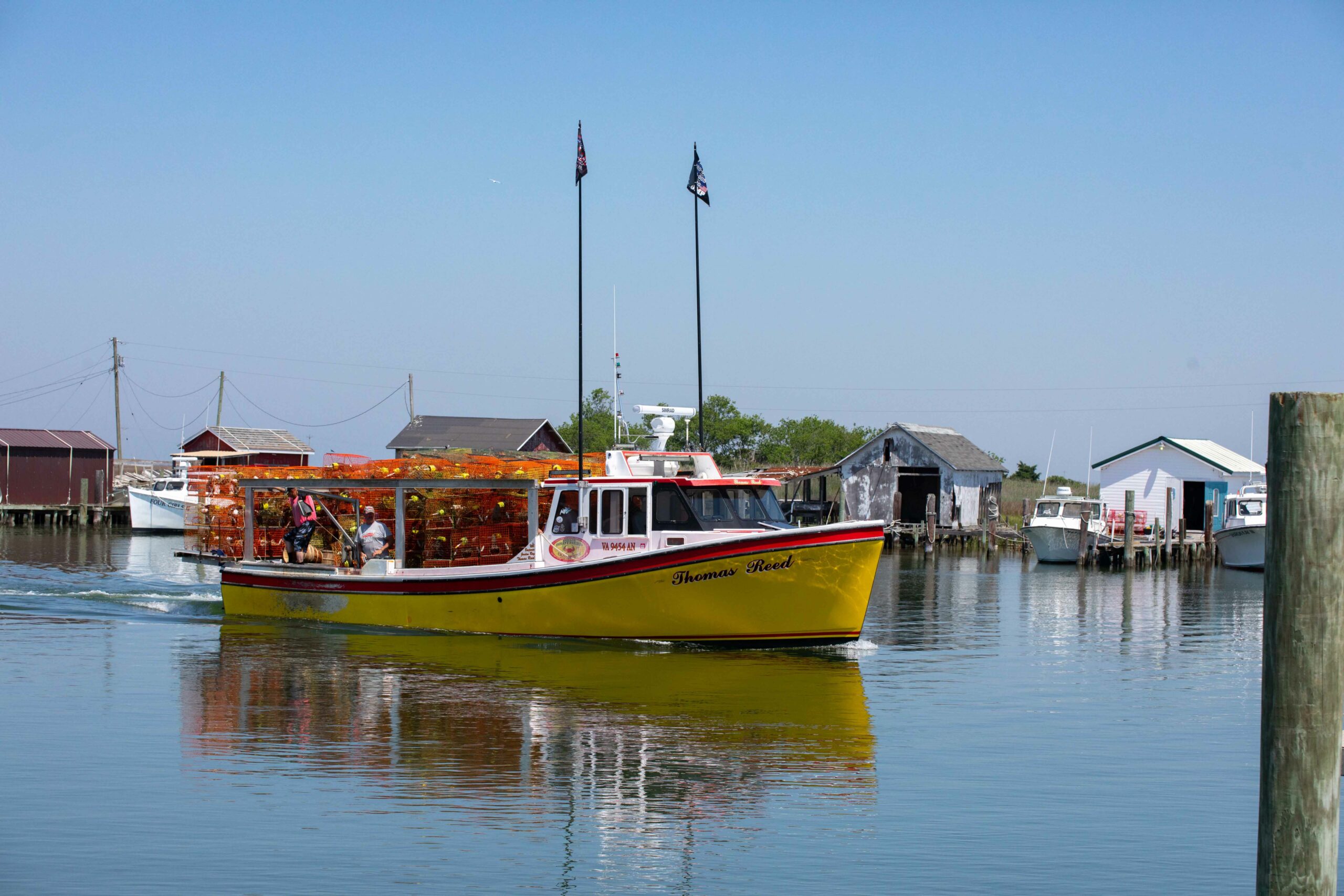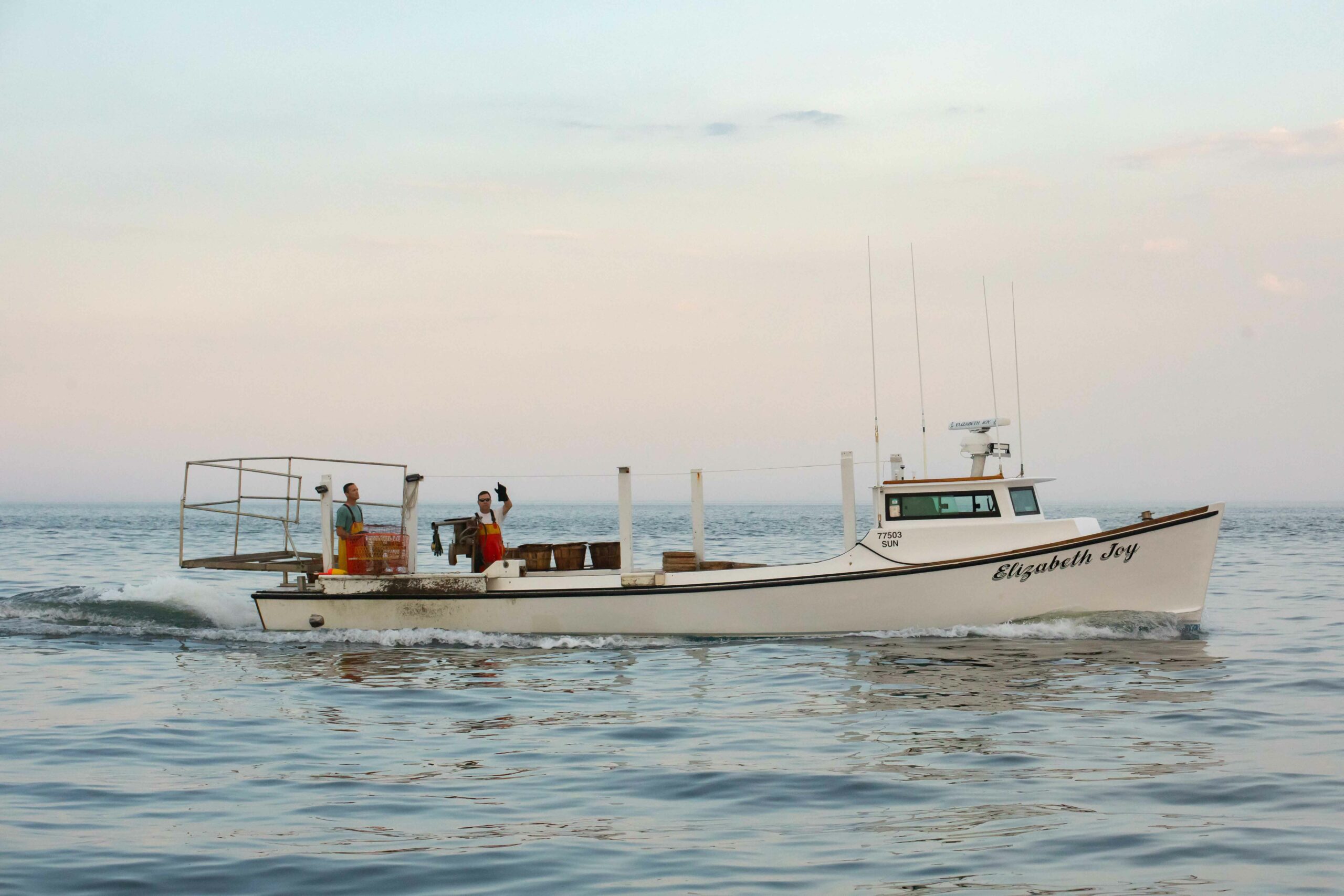THE
CHANGING
ISLAND
THE
CHANGING
ISLAND
Graduating seniors reflect on the transformation of Tangier Island.
Story: John Donegan | Photos: Crixell Matthews
Graduation Day
Cast between the dueling coastlines of the Eastern Shore and seated in the center of the Chesapeake Bay, Tangier Island is mostly quiet, save for the sound of an organ. It’s graduation day, the third biggest holiday the islanders celebrate, losing only to the birth and death of Christ.
Outside Swain Memorial United Methodist Church, no one is around. All the boats at the docks are knotted and moored. All the bicycles, ATVs and golf carts, the primary traffic on the island, are parked along the narrow gravel shoulders, some with the keys still hanging from their ignitions. During their preparation at the Benson Education Building next door, the graduating seniors make jokes and take selfies to break the anxiety of the moment. Kevin Thomas paces the room, eyes glued to a binder holding his speech. Each senior has prepared one.
“Tonight you achieve a milestone,” said Superintendent Chris Holland in his opening remarks. “Never forget your roots. This country is based upon those who work with their hands.”
The emotions hanging over Tangier Combined School’s graduation day are the culmination of thirteen years for these eight close-knit classmates. Each fights back tears as they speak. Each tells their classmates countless times that they love them and will cherish the life they have built on Tangier together. Each expresses vulnerability and gratitude – something that feels like a deep, sad farewell.
“We are nervous because we don’t know what the future holds for us,” said Kevin Thomas in his salutatorian address. All the graduates have decided to leave the island in search of opportunity elsewhere. But after 13 years together, leaving home is difficult.
Graduating seniors reflect on the transformation of Tangier Island.
Story: John Donegan | Photos: Crixell Matthews
Graduation Day
Cast between the dueling coastlines of the Eastern Shore and seated in the center of the Chesapeake Bay, Tangier Island is mostly quiet, save for the sound of an organ. It’s graduation day, the third biggest holiday the islanders celebrate, losing only to the birth and death of Christ.
Outside Swain Memorial United Methodist Church, no one is around. All the boats at the docks are knotted and moored. All the bicycles, ATVs and golf carts, the primary traffic on the island, are parked along the narrow gravel shoulders, some with the keys still hanging from their ignitions.
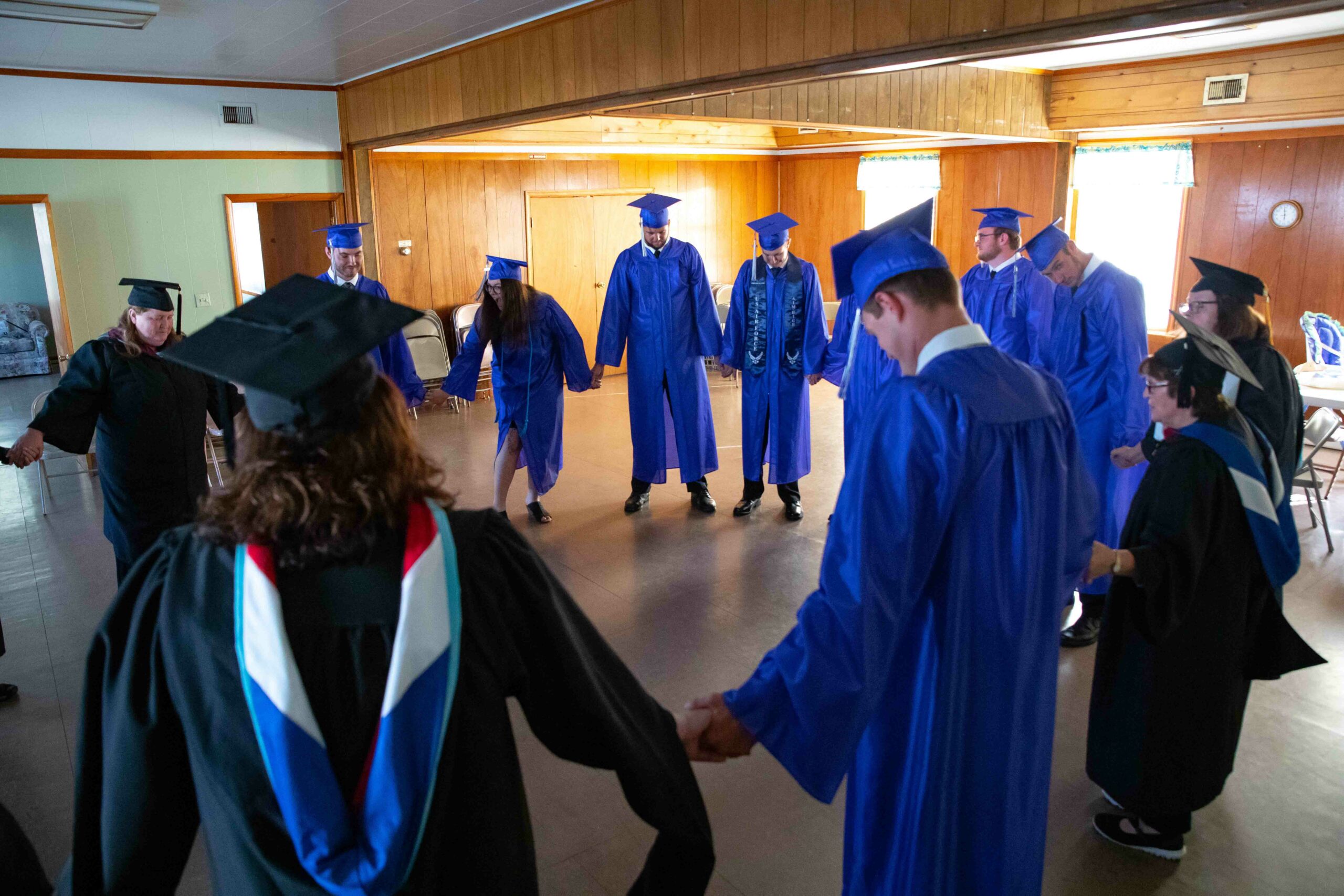
During their preparation at the Benson Education Building next door, the graduating seniors make jokes and take selfies to break the anxiety of the moment. Kevin Thomas paces the room, eyes glued to a binder holding his speech. Each senior has prepared one.
“Tonight you achieve a milestone,” said Superintendent Chris Holland in his opening remarks. “Never forget your roots. This country is based upon those who work with their hands.”
The emotions hanging over Tangier Combined School’s graduation day are the culmination of thirteen years for these eight close-knit classmates. Each fights back tears as they speak. Each tells their classmates countless times that they love them and will cherish the life they have built on Tangier together. Each expresses vulnerability and gratitude – something that feels like a deep, sad farewell.
“We are nervous because we don’t know what the future holds for us,” said Kevin Thomas in his salutatorian address. All the graduates have decided to leave the island in search of opportunity elsewhere. But after 13 years together, leaving home is difficult.
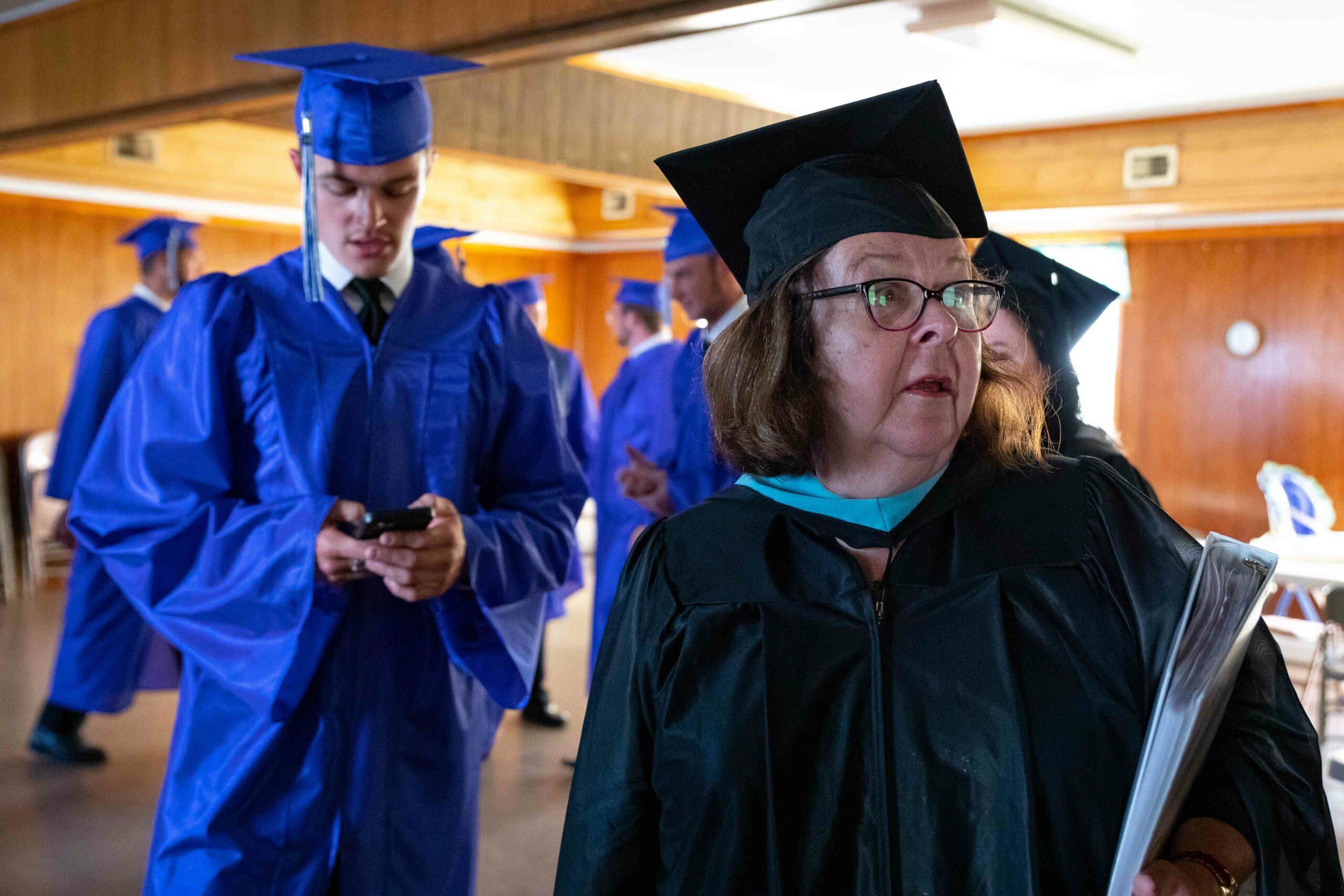
“It seems like just yesterday, that I became your first grade teacher,” said Tangier Combined School Principal Sharon Haynie. “And it was my job at the time to make you read, write and understand the world. … Over the years, I’ve come to learn that I have learned as much from the students as they have learned from me. These students here tonight changed my life.”
Like the rest of his schoolmates, Samuel Parks has attended Tangier Combined School, Virginia’s only comprehensive K-12 public school, since Kindergarten. In 1999 the school had about 120 students and nine seniors. By 2022 enrollment dropped to 48 total students.
Samuel’s family has lived on the island for generations, sharing kinship ties with many neighbors and friends. Pruitt, Parks, Eskridge and Crockett are common surnames on Tangier, some dating back to its 17th century founders.
“It seems like just yesterday, that I became your first grade teacher,” said Tangier Combined School Principal Sharon Haynie. “And it was my job at the time to make you read, write and understand the world. … Over the years, I’ve come to learn that I have learned as much from the students as they have learned from me. These students here tonight changed my life.”
Like the rest of his schoolmates, Samuel Parks has attended Tangier Combined School, Virginia’s only comprehensive K-12 public school, since Kindergarten. In 1999 the school had about 120 students and nine seniors. By 2022 enrollment dropped to 48 total students.
Samuel’s family has lived on the island for generations, sharing kinship ties with many neighbors and friends. Pruitt, Parks, Eskridge and Crockett are common surnames on Tangier, some dating back to its 17th century founders.

Principal Sharon Haynie gathers the students as they prepare to walk to the graduation ceremony next door.
“I’ve grown up with the same seven [people] in my class — all my life as far back as I can remember,” said Samuel Parks, the class valedictorian, who graduates with a 3.8 GPA. “It’s been a lot of mixed emotions. But I’m mostly happy. You know, it’s a big day for all of us … as we move on.”
“Man it’s crazy to think [that] since I was young I’ve been waiting for this day, but now it’s finally [here] and it just feels like it’s not even real, you know what I mean?” said Benjamin Eskridge, who won the school history award.
“Growing up as a kid and stuff, it was actually pretty fun,” said graduating senior Riley Mariano, who plans to attend Old Dominion University’s nursing program in the fall. “But now it’s boring. There’s nothing here.”
“I’ve grown up with the same seven [people] in my class — all my life as far back as I can remember,” said Samuel Parks, the class valedictorian, who graduates with a 3.8 GPA. “It’s been a lot of mixed emotions. But I’m mostly happy. You know, it’s a big day for all of us … as we move on.”
“Man it’s crazy to think [that] since I was young I’ve been waiting for this day, but now it’s finally [here] and it just feels like it’s not even real, you know what I mean?” said Benjamin Eskridge, who won the school history award.
“Growing up as a kid and stuff, it was actually pretty fun,” said graduating senior Riley Mariano, who plans to attend Old Dominion University’s nursing program in the fall. “But now it’s boring. There’s nothing here.”


The (Former) Soft Shell Capital of the World
In Tangier, there’s an old saying: “If you don’t work the water, what do you do?” The saying was once a creed, repeated among watermen with pride. Longshoremen believed in these waters, as if the bay would always provide for them. That creed is now laced with uncertainty. Tangier has been under severe economic strain for decades. The town gained its wealth and notoriety through tourism and fishing, though the latter industry has seen a sharp decline over the past 20 years. Almost every able bodied Tangier man today still makes his living on blue crabs and oysters, despite challenges. Kids often work at their parent’s proprietorship, such as a restaurant or skiff.
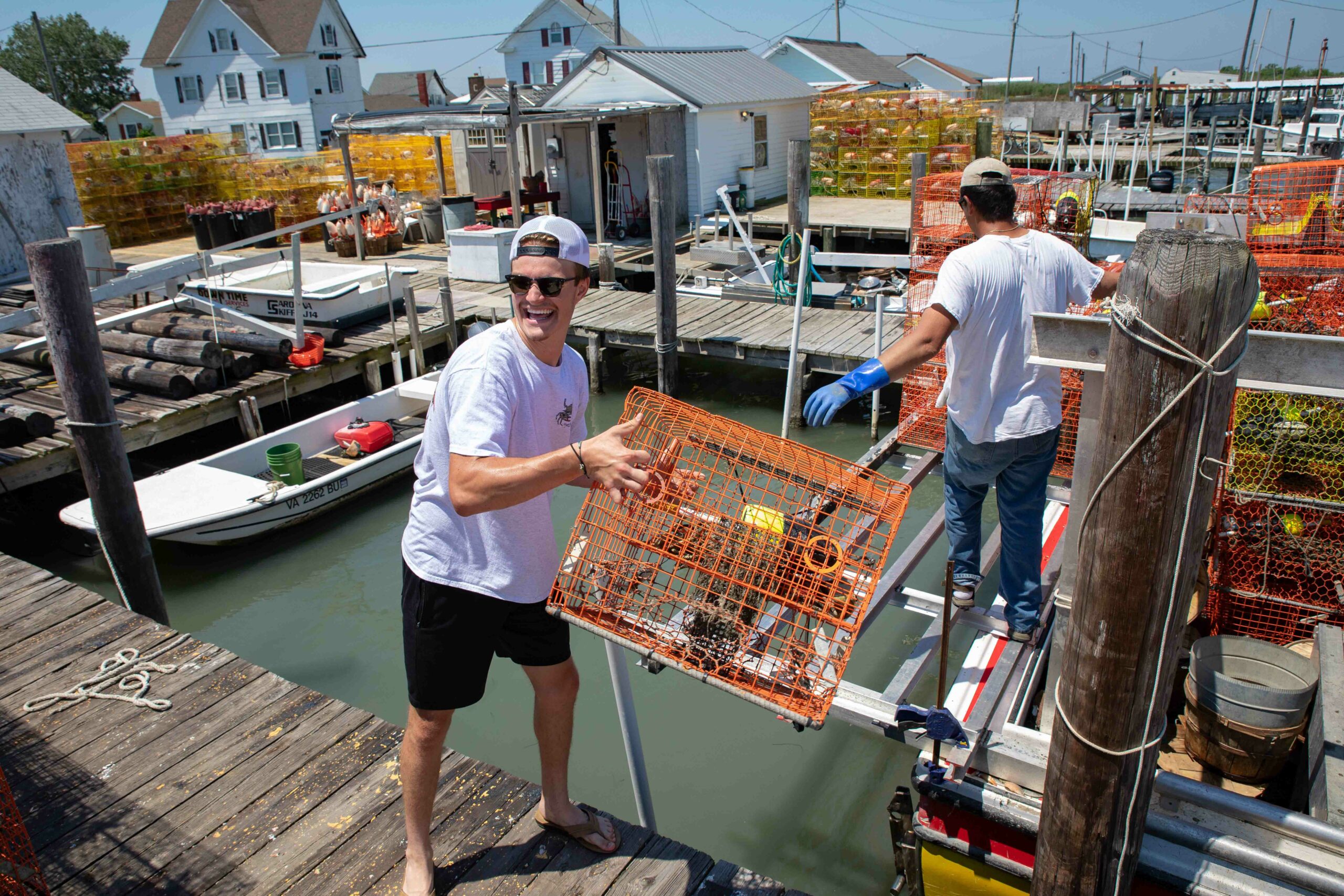
For Benjamin Eskridge, life on the island as a teenager “is to work,” he said. “Whatever my dad wants me to do. I do all that I can to help him. It’s really not much different, except the fact that the fun things we do here aren’t ideally the same as people would do on the mainland.”
Benjamin’s father runs the Four Brothers Crab House, a local restaurant, along with an Airbnb rental, a gift shop, an ice cream store and his own crabbing operation. He’s also contracted with NASA, helping recover rockets that launch from nearby Wallops Island. When we visited him down at the dock, Benjamin and his father, along with his brother and two fellow watermen, were pulling crab pots – cages made of chicken wire – for the season. “It’s a family operation,” Benjamin said. “All hands on deck, for everything we do.”
At the start of the season in March, pots are dropped into spots throughout the bay. From there it’s a cycle: oysters from December through February; hard crabs from March to November; and soft shells May into October.
Commercial crabbing requires a license, costing upwards of $50,000. Due to a longstanding moratorium on new crabbing licenses, as part of an effort to curb overfishing, acquisition of a crabbing license has become extremely competitive. Many youth interested in the industry must either rely on a family member’s existing license, or leave the island to work for a larger outfit.
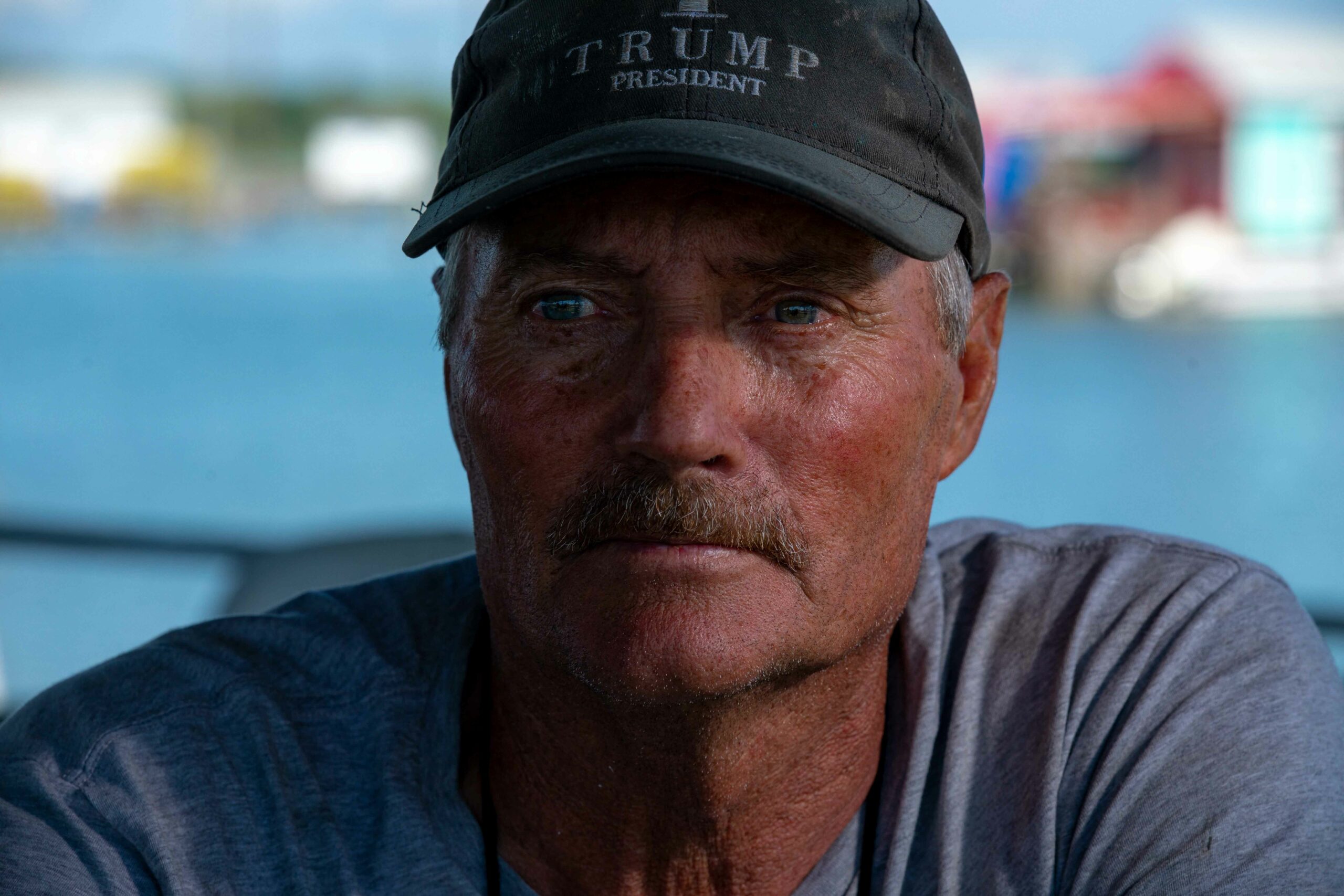
“You need regulations, but you also need to balance things out,” said James Eskridge, or “Ooker” as he’s known around town, the town’s mayor and Benjamin’s uncle. “You can regulate people out of business. We want a healthy resource – that’s our livelihood. We don’t have the resources, we’re out of business.”
The 2022 Baywide Blue Crab Winter Dredge Survey, conducted by the Maryland Department of Natural Resources and the Virginia Institute of Marine Science, found the number of blue crabs fell to 227 million, the third consecutive year it fell below average and the lowest since the survey started in 1990.
According to Chesapeake Bay Foundation Senior Regional Ecosystem Scientist Chris Moore, there’s no simple answer as to why crab populations have gone down the past three years.
“The results of this year’s survey continue a worrying trend for blue crabs in the Chesapeake Bay region,” Moore said. According to him, myriad factors cause the low crab count; warm waters, predation by catfish and an introduction of toxic chemicals into the bay, among other sources, all play a role.
“The continued low abundance of juveniles and adult males indicates the urgent need for action to protect these segments of the population.”
Moore added that one of the most effective ways of managing crab numbers is through limiting harvest, which comes at the cost of restricting watermen’s numbers. In 2008, following low population numbers, jurisdictions along the bay imposed a 34% reduction in the harvest of blue crab in order to meet the minimum population threshold. Over a decade later, the limit is still in effect. At the end of June, the Virginia Marine Resources Commission imposed new restrictions on the 2022/23 blue crab season, including a shorter season and tighter bushel limits. What was once billed as the “soft shell crab capital of the world” is now seen as a risky investment.
Benjamin’s father told us while unloading the pots that the crab count is fickle in nature, and that it rises and falls much like the tide. “You have a few years and it’s good,” Eskridge said. “And then you can have one or two years and [it’s] slow. Always been like that.”
The four seniors who announced plans to become watermen will join bigger outfits in Baltimore and Philadelphia, though they intend to spend half their time in Tangier. Benjamin has no desire to join his dad’s operation. Instead, he is joining the Maryland State Police in August, as the newest member of the Delmar department.
“I’m not really trying to own my own boat and own my own crab pots,” Benjamin said. “It’s just really a gamble when you think about it… I want a job that [promises] money. I want a career path.”
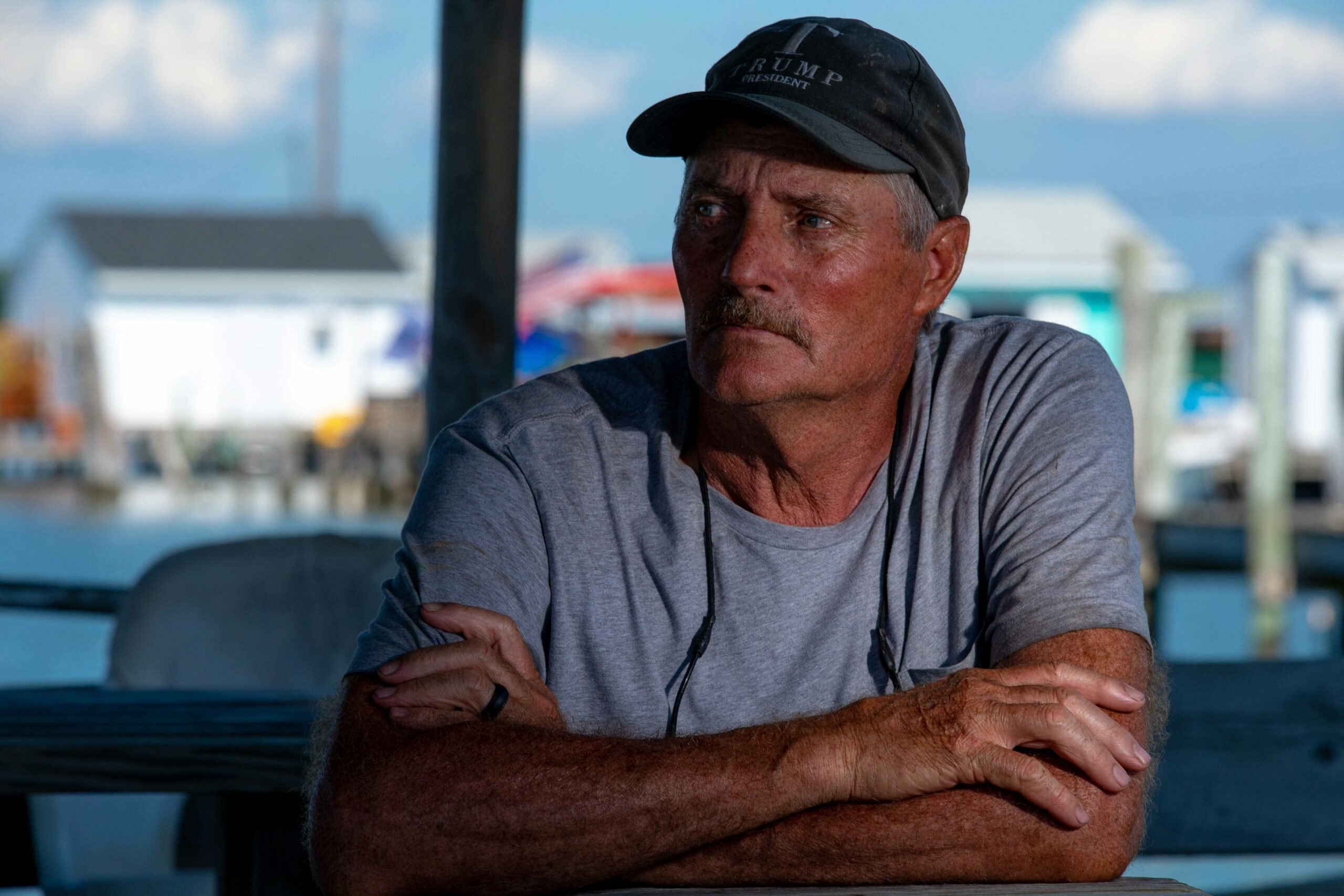
Mayor James “Ooker” Eskridge speaks with us under the shade of a gazebo near one of the ferry docks.
“You need regulations, but you also need to balance things out,” said James Eskridge, or “Ooker” as he’s known around town, the town’s mayor and Benjamin’s uncle. “You can regulate people out of business. We want a healthy resource – that’s our livelihood. We don’t have the resources, we’re out of business.”
The 2022 Baywide Blue Crab Winter Dredge Survey, conducted by the Maryland Department of Natural Resources and the Virginia Institute of Marine Science, found the number of blue crabs fell to 227 million, the third consecutive year it fell below average and the lowest since the survey started in 1990.
According to Chesapeake Bay Foundation Senior Regional Ecosystem Scientist Chris Moore, there’s no simple answer as to why crab populations have gone down the past three years.
“The results of this year’s survey continue a worrying trend for blue crabs in the Chesapeake Bay region,” Moore said. According to him, myriad factors cause the low crab count; warm waters, predation by catfish and an introduction of toxic chemicals into the bay, among other sources, all play a role.
“The continued low abundance of juveniles and adult males indicates the urgent need for action to protect these segments of the population.”
Moore added that one of the most effective ways of managing crab numbers is through limiting harvest, which comes at the cost of restricting watermen’s numbers. In 2008, following low population numbers, jurisdictions along the bay imposed a 34% reduction in the harvest of blue crab in order to meet the minimum population threshold. Over a decade later, the limit is still in effect. At the end of June, the Virginia Marine Resources Commission imposed new restrictions on the 2022/23 blue crab season, including a shorter season and tighter bushel limits. What was once billed as the “soft shell crab capital of the world” is now seen as a risky investment.
Benjamin’s father told us while unloading the pots that the crab count is fickle in nature, and that it rises and falls much like the tide. “You have a few years and it’s good,” Eskridge said. “And then you can have one or two years and [it’s] slow. Always been like that.”
The four seniors who announced plans to become watermen will join bigger outfits in Baltimore and Philadelphia, though they intend to spend half their time in Tangier. Benjamin has no desire to join his dad’s operation. Instead, he is joining the Maryland State Police in August, as the newest member of the Delmar department.
“I’m not really trying to own my own boat and own my own crab pots,” Benjamin said. “It’s just really a gamble when you think about it… I want a job that [promises] money. I want a career path.”
The Island in the Bay
Along Main Ridge Road, which runs through the town’s center, is a brief congregation of buildings that rise gracefully, seemingly out of nowhere, like a tiny wonder of the world. Marshland and creeks divide the town’s three upland ridges – Main Ridge, West Ridge and Canton Ridge. Each stands a mere four feet above sea level, the highest points of the island.
Despite the surrounding vista of water and sky, the island itself is tightly spaced. The alley-width roads are unevenly paved. Houses are often inches from one another, and the number of spots to get away from everyone are limited. Junked speed boats lay in lawns. Defunct signs of past businesses tag the landscape like soggy, windburnt postcards. Hollowed out homes, no longer suitable for use, fall further and further into disrepair.
The inhabitants of the village, about 380 people, are quite content with their insular bay lifestyle. They work, fish, ride ATVs, attend their crab pots and church social club meetings. No alcohol or cannabis is sold, though people still drink and smoke within the privacy of their homes. Many locals are older, retired and live on fixed incomes.
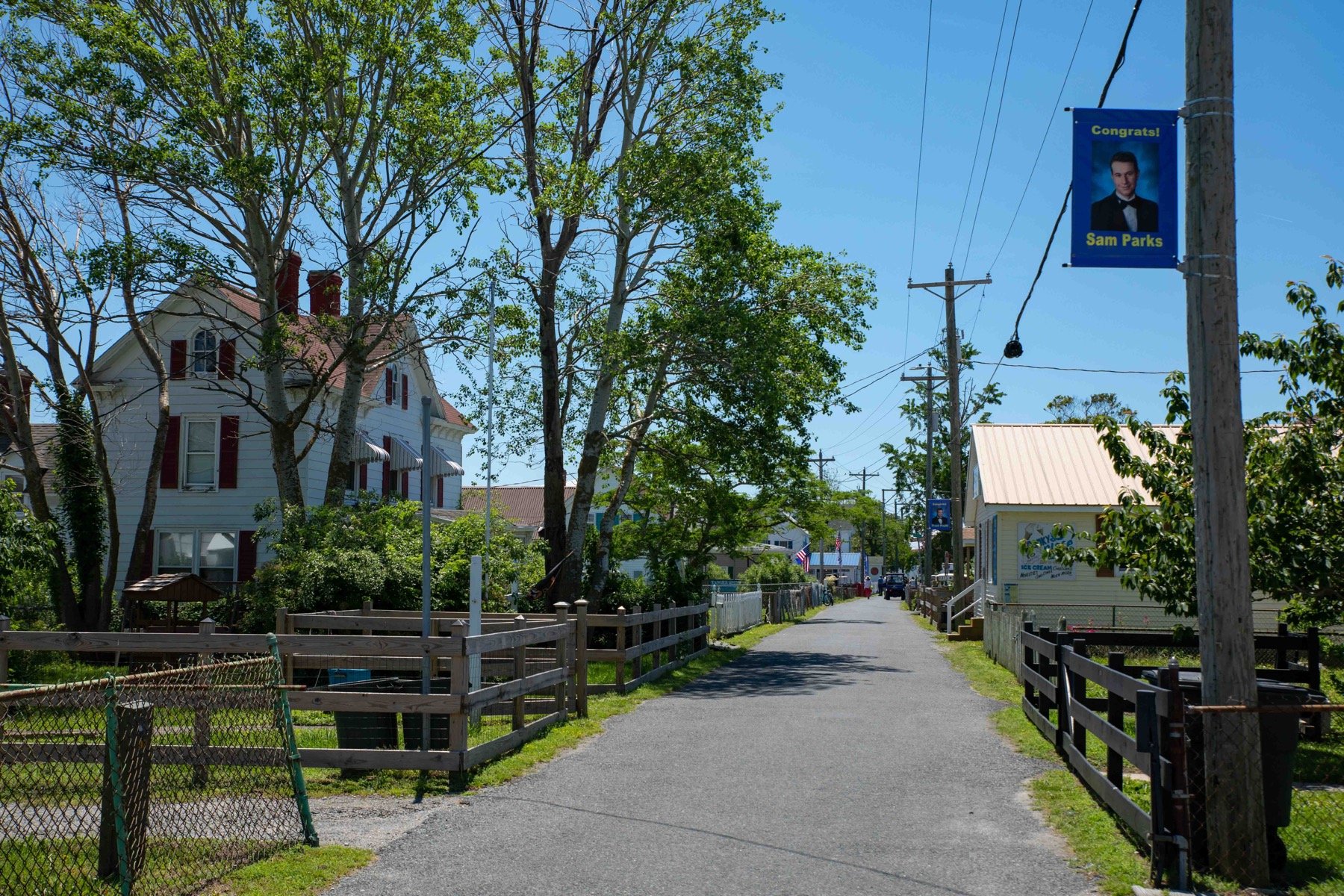
Farther down this section of Main Ridge Road, which hosts an ice cream shop on the right and a home on the left, are the Tangier History Museum and a gift shop.
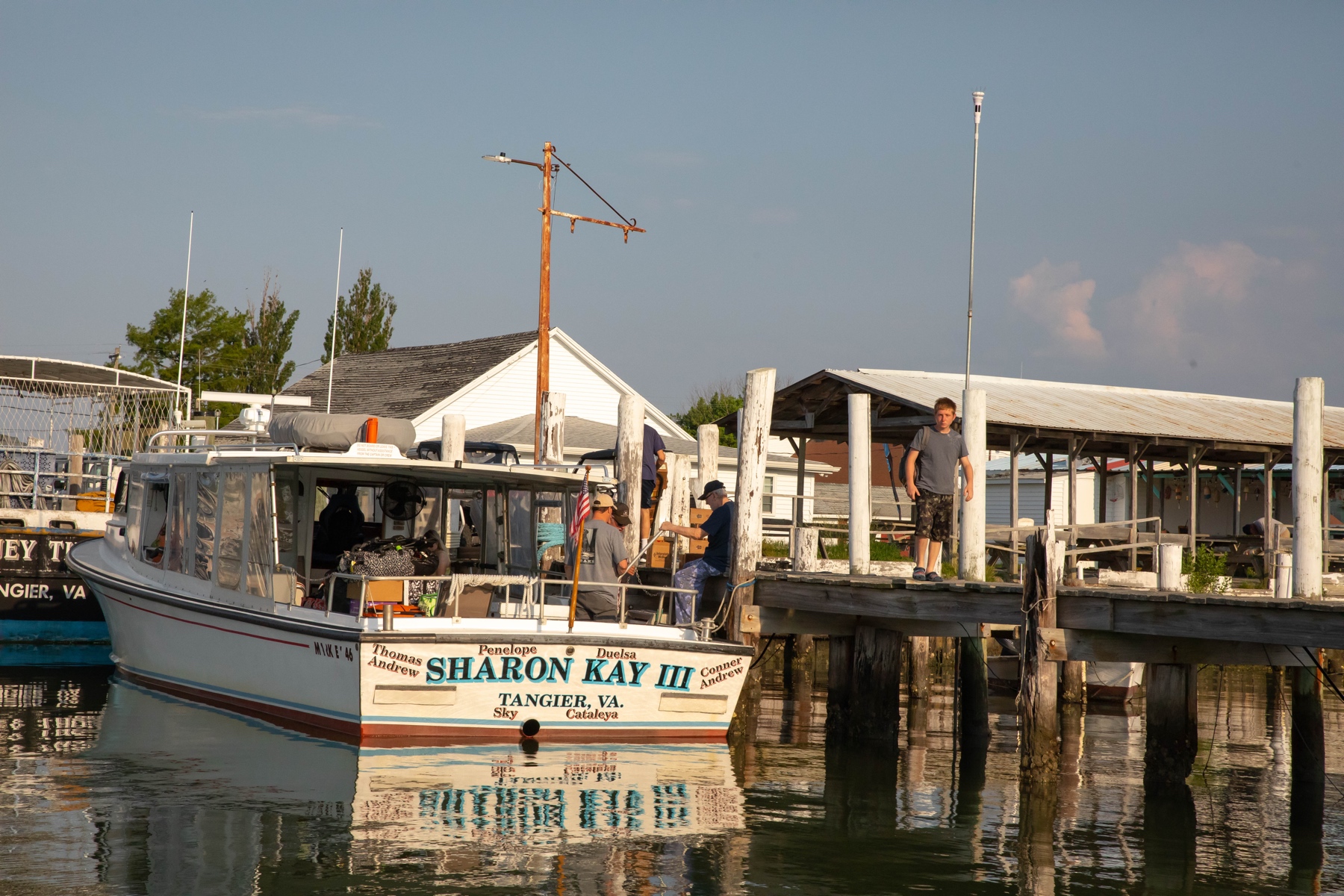
Islanders use ferries to travel to and from the mainland, and to get their mail and groceries delivered to them.
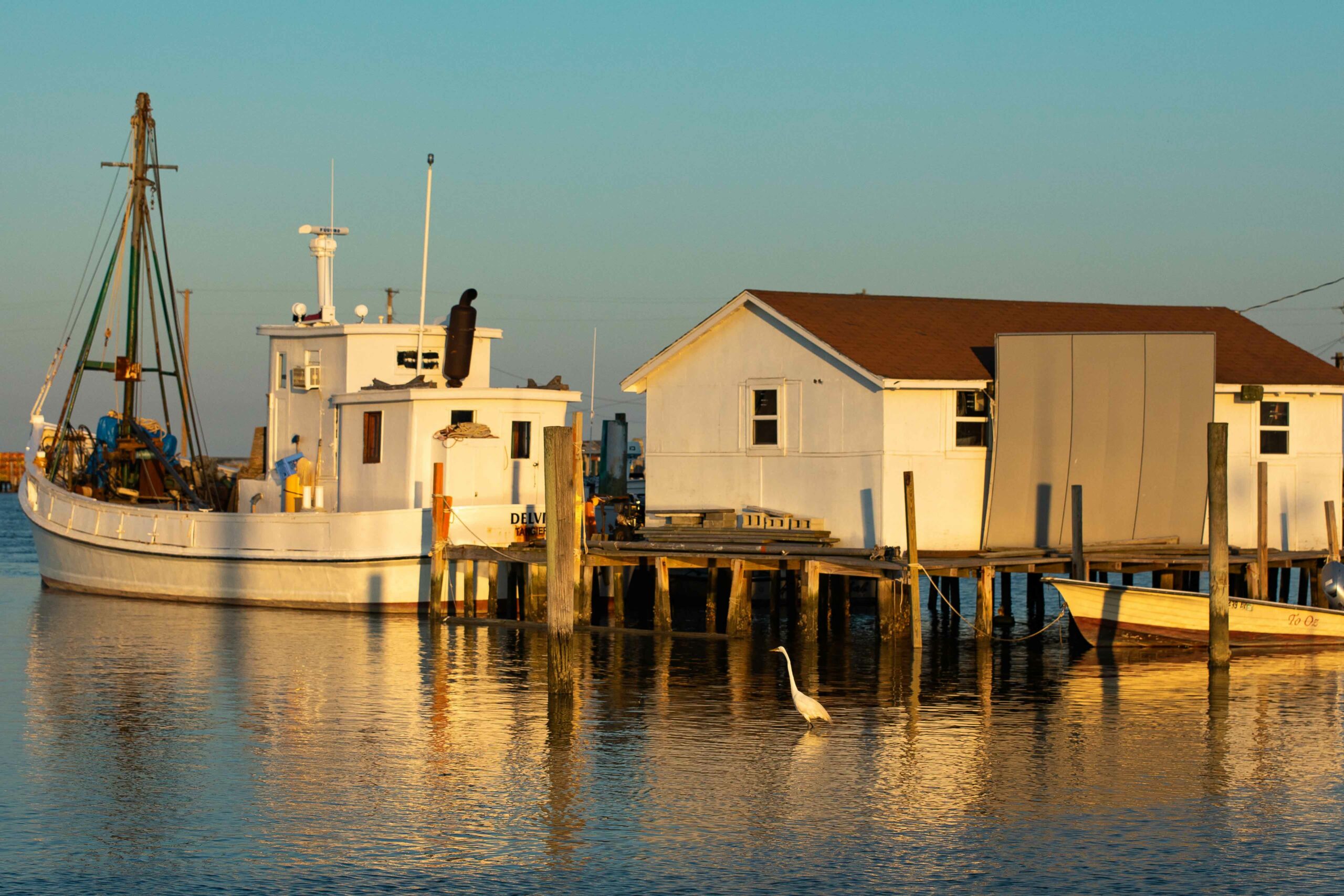
911, What’s Your Emergency
The average age of a Tangier resident is about 52, — 14 years older than the national average. Each earns an average salary of $41,000 annually, according to a 2019 report by Data USA. By contrast, the population relies significantly on the island’s youth to fulfill roles vital to the town’s infrastructure. Benjamin, with five other departing graduates, volunteers for the Tangier Fire & Rescue Department. They account for 75% of the force and handle about 60% of the calls, according to Deputy Fire Chief Rob Baechtel.
“The kids here are, by and large, very well behaved and willing to help,” Baechtel said. “At 16, I’m having to call their principal and say, ‘Hey, can I have two people? I need to load a patient up?’ Or if the fire whistle goes off, they’re leaving school to go up and help fight a fire. You don’t see that a lot on the mainland, and a lot of parents on the mainland probably wouldn’t let that happen. You know, here the parents realize, ‘Hey, if not them, who’s gonna do it?’”

Above: Riley Mariano in her fire fighter gear | Sam Parks in front of the Tangier Ambulance
Most calls are minor emergencies, like heat stroke or a marsh fire. Yet, on a number of occasions, these teenaged firefighters, often the first ones to arrive on scene, take critical action, assess medical need or perform CPR. In the last two major fires, Baechtel had three members of the graduating class manning the water hose. The department is not sure who will replace them.
“All the officers make it very clear how much they’re gonna miss us,” Benjamin said. “It’s a lot of people they’re gonna lose. And there’s not anybody coming in … It’s really a loss for the island, and I hate it. But you know, I gotta keep going.”
Losing the Land: Erosion Versus Climate Change
In almost any direction, Mayor James Eskridge can point to a perch or marker sticking out from the bay. Each spot, he said, was once a visible part of the island’s landscape. Within his lifetime, these features have disappeared into the water. “Sometimes I’ll crab on a spot that used to be high ground with trees on it,” Eskridge said. “Sometimes crab traps will get hung up in tree stumps.”
In fact, the 14 years Eskridge has held his mayoral post, encompass the roughest, most economically challenging period the region has known since their ancestors settled there in the late 17th century.
When asked about climate change, his response smacks of a line rehearsed and repeated time and again.
“We’re losing our land,” he said. “We’ve lost two-thirds of our land area since 1850. Our shorelines are a soft material and easy to erode. Constant wave action, day in, day out, just use it up. Nothing new (has) been going on since John Smith sailed in here. But now it’s to our doorstep, so you focus on it more.”
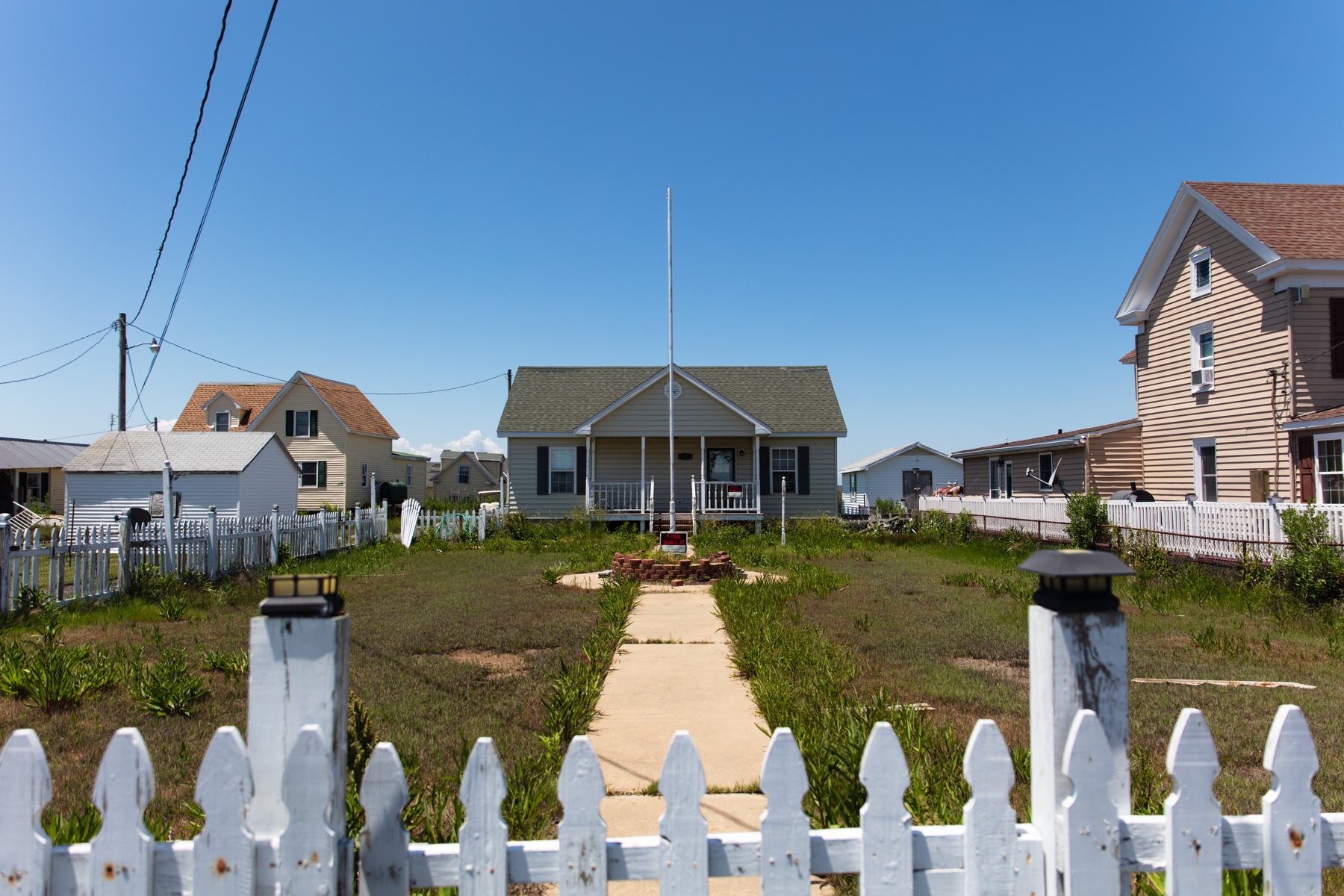
“I personally don’t see (Tangier) getting the funding to save the island. Something big would have to change and I’m not sure if anyone would be willing to do it,” said Dave Schulte. (Photo: John Donegan)
Ooker looks every bit the longshoreman. His skin is deeply tanned, windburned, and weathered. His blue-eyed gaze is piercing. He has the natural reserve and confidence of a respected leader. He is the community’s most widely known citizen, the middleman between Tangier and the outside world. With regard to his community, Ooker has one cause for disquiet: Tangier’s erosion. When asked about his views, he is direct but also careful, so as to avoid making a nuisance of them. “I don’t believe [climate change] is manmade,” Eskridge said. “I think it’s natural. I don’t think my hands can be able to do anything about it. I think man has given himself too much credit if he thinks he can control the climate.”
The island became an international news sensation in 2017, when then-President Donald Trump placed a phone call to Ooker. Tangier was subsequently often relegated to a populace of Trump-supporting, climate change deniers.
Yet, contrary to reports, many islanders of Tangier believe in climate change. They simply do not think it is the driving factor behind loss of land, but rather, a combination of wave-induced erosion and inadequate seawalls, something Eskridge and other town leaders have pointed to for years. Eskridge and others are certain that reinforcing the island’s shoreline would address their problems, at least with erosion.
Town of Tangier occupied housing flooding at spring tide and recent precipitation. Note the house has been raised, the walkway has not and is currently flooded. Most of the yard of the property has been converted to wetlands. (Photographer: Patrick Bloodgood, Source: USACE, Norfolk District)
Dave Schulte, a marine biologist with the U.S. Army Corps of Engineers, has spent much of his career studying the island’s sinkage. No story on Tangier’s changing landscape has been complete without his findings. A 2021 report by Schulte and his son, fellow researcher Zehao Wu, predicted the island will be totally underwater by 2051— about a decade earlier than previously thought. Two of the three ridges could be uninhabitable within the next decade.
While much debate surrounds the island’s diminishing borders, Schulte notes that sea level rise comes not only from shorelines, but from porous ground. Schulte explains that there is no protective soil layer preventing the rising water table, causing periodic flooding throughout the town, including areas free of coastal erosion.
“On the western shore of the island, erosion is a bigger factor than climate change, which is basically sea level rise,” he explained. “But everywhere else on the island sea level rise is your dominating factor.”
“As the sea level rises, the water table comes right up with it,” Schulte explained. “So at this point, there are several areas around town where there is standing water in people’s yards.” At some point Schulte explains, “they’ll still be above water most of the time, but … flooded by high tide every day.”
“If you get a nor’easter or a tropical system, half or better half of the island will go underwater,” Eskridge said. “Like on the west side, most of that whole street goes underwater. Nothing new. You just learn to live with it.”
A New Vision for Tourism
The primary industry on the island, besides fishing, is tourism. During the summer, several cruise ships pull into the harbor each day, unloading curious passengers who often wander into Cameron Evans’ shop, which sits right in front of the dock. Evans, who graduated from Virginia Wesleyan in May returned to the island to run his store full time.
At its height in the 1940s, the island had about 2,060 acres and housed about 1,000 people, according to U.S. census data. It was famous across the Eastern Shore for its specialty watermelon, pig farms and assorted flora, but also as a flyby refuge to a myriad of birds, including varieties of pelicans, herons, rails, osprey and several types of ducks. The island, along with Smith Island, is among the “few remaining population strongholds for American Black Ducks in Virginia,” according to the National Audubon Society.
Tangier’s positioning as a refuge for birds and its spectacular views are assets Cameron Evans feels are not exploited.
“I feel like the thing that’s going to save this [island] is more tourism, more utilizing what’s here,” Evans said. “There’s a lot of things that could be done differently.”
“I feel like the thing that’s going to save this [island] is more tourism, more utilizing what’s here,” Evans said. “There’s a lot of things that could be done differently.”
Evans has a vision for Tangier’s future that puts his recent business degree to use, and challenges tourism norms long observed on the island. At 21, his decision to return and settle down on Tangier goes against the prevailing trend of departing youth. “Every time I leave and come back, I notice that the land sizes and some of the more noticeable places, like the entrance to the island are getting smaller and smaller,” Evans said. “And I mean, it hurts. It feels like the place that’s basically raised me is slowly dying.”
Despite bleak predictions, Evans believes the right spark of interest could revive and fast-track preservation efforts. But it would mean bringing Tangier into the realm of 21st century tourism — kayaking, updated restaurants, conservation tours, coupled with fine art photography.
Rob and Barbara Baechtel also represent an anomaly among the Tangier population. The couple, native mainlanders, chose to leave Washington, D.C., and make Tangier their permanent home. They, too, envision a tourism renaissance on the island. Since being here, the couple has taken over and renovated the Brigadune Inn, one of two hotels left on the island. Baechtel said it has been their mission to help bring hope to the community.
“It’s not necessarily a matter of when the island won’t be here, it’s when the island is not functionally habitable,” Baechtel said. “Because tomorrow we could lose our sewage treatment plant or we could lose the fuel dock and life would dry up pretty quick here.”
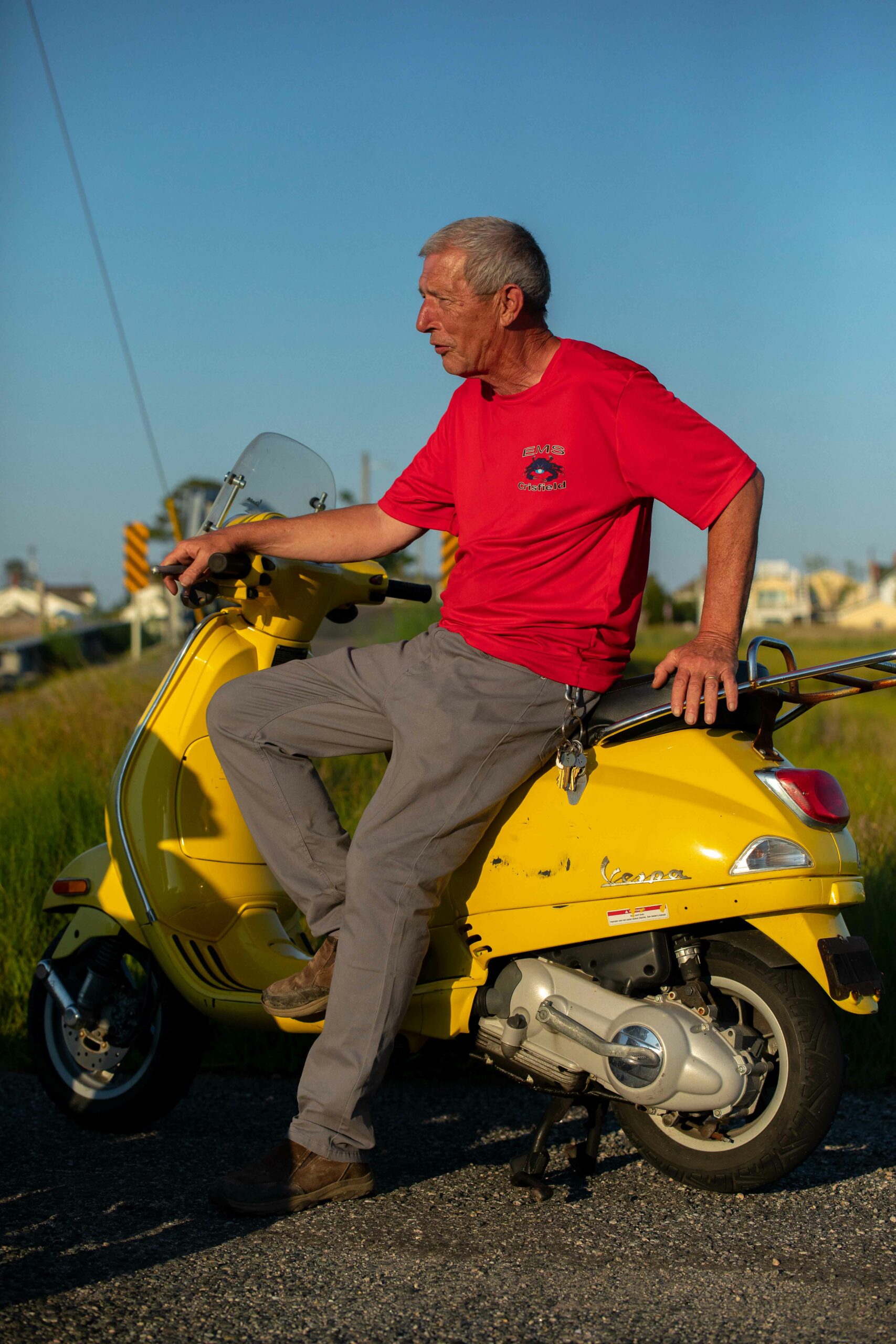
“As a cop on the streets of D.C., I saw it all. I never felt like I could make a difference where I was working… Here, I see it every single day. I feel much more vital here than I ever have in my life.” – Deputy Fire Chief Robert Baechtel
Both the Baechtels and Evans want the island and its inhabitants to be known for something other than their ties to Trump and ideas on climate change. Both are hopeful about the island’s fate, though it depends greatly on whether they get the help they need.
“It’s frustrating,” Evans said. “Because I mean, we’re promised a lot, and it seems like a lot of times we’re living off broken promises. Even though Evans returned to the island, he admits that if he didn’t have the skills he had, he would consider moving.
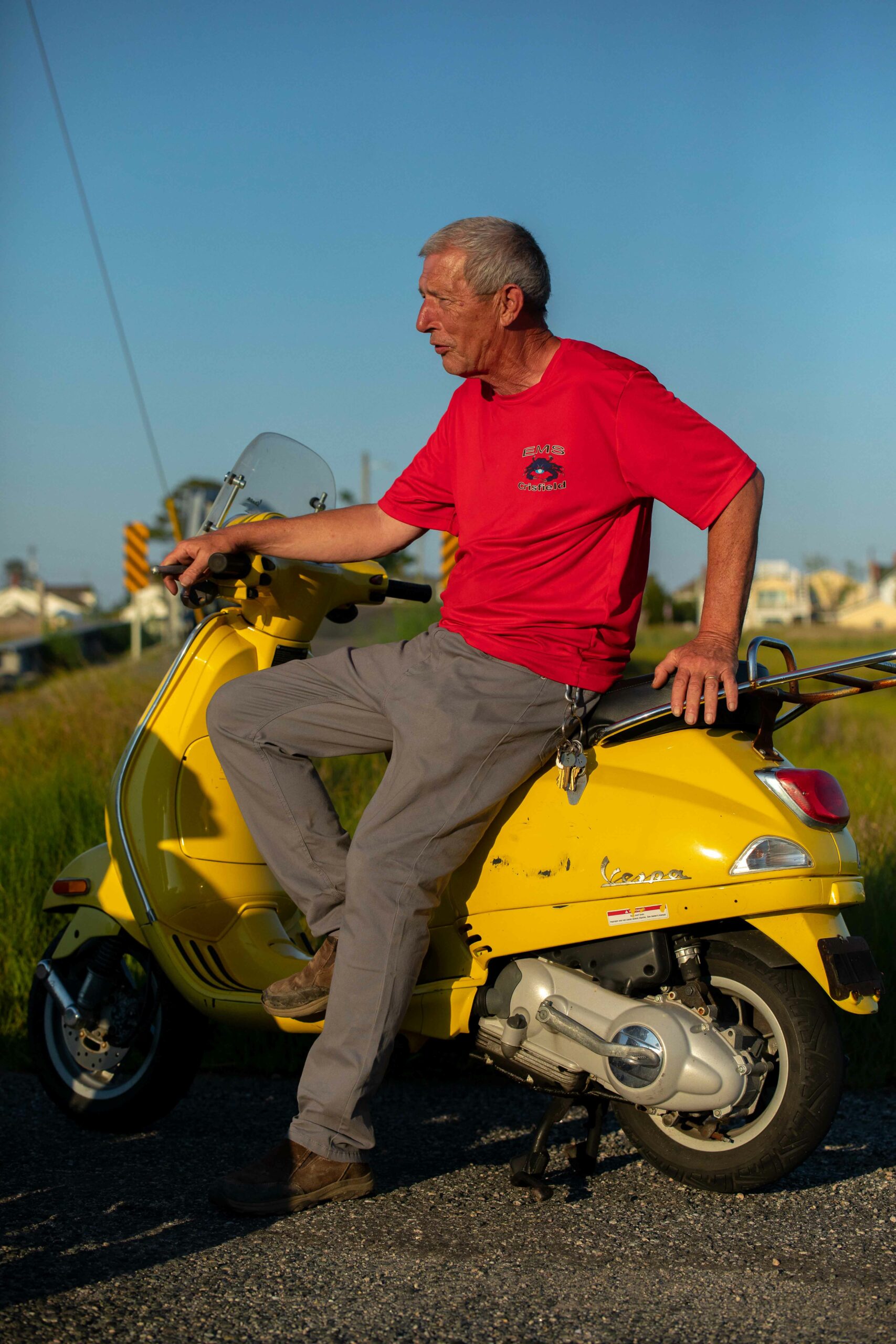
“As a cop on the streets of D.C., I saw it all. I never felt like I could make a difference where I was working… Here, I see it every single day. I feel much more vital here than I ever have in my life.” – Deputy Fire Chief Robert Baechtel
Both the Baechtels and Evans want the island and its inhabitants to be known for something other than their ties to Trump and ideas on climate change. Both are hopeful about the island’s fate, though it depends greatly on whether they get the help they need.
“It’s frustrating,” Evans said. “Because I mean, we’re promised a lot, and it seems like a lot of times we’re living off broken promises. Even though Evans returned to the island, he admits that if he didn’t have the skills he had, he would consider moving.
Why Tangier’s Youth are Leaving
When asked their thoughts about climate change, each of the seniors was similarly indifferent and dismissive. None attributes their decision to leave to environmental forces. They want to leave because there is simply nothing to keep them. Their reasoning is very matter-of-fact: like the crab harvests, Tangier has been in constant decline and offers few options for a career.
Principle Haynie is not surprised that the seniors are leaving. “Nothing unusual, we expected that because of a lack of opportunities here on the island,” she said. “I think young people today certainly have more challenges and things to encounter than I did when I graduated from high school. Principal Haynie made an announcement during the graduation ceremony that she was retiring. There is no replacement for her at this time.
“[Climate Change [is] just not stuff we talked about,” Riley said. “We talked about leaving a lot. I think everybody’s ready to go… I’m not really leaving anything behind.”
“I think with most of [our] career paths nowadays, it doesn’t really include Tangier,” Benjamin said. “If you’re not going to be a waterman, or don’t want to work at one of the restaurants around, there’s not really many opportunities. I do believe that the majority of people will be moving to the mainland, at least for a good period of time.”
“Well, I know that [Climate Change] it’s a thing, but I don’t think about it too hard, just because I haven’t seen the changes around here,” Sam said. “But um, I know that the sea levels rise and fall. That’s a natural thing.”
“[Climate Change [is] just not stuff we talked about,” Riley said. “We talked about leaving a lot. I think everybody’s ready to go… I’m not really leaving anything behind.”
“I think with most of [our] career paths nowadays, it doesn’t really include Tangier,” Benjamin said. “If you’re not going to be a waterman, or don’t want to work at one of the restaurants around, there’s not really many opportunities. I do believe that the majority of people will be moving to the mainland, at least for a good period of time.”
“Well, I know that [Climate Change] it’s a thing, but I don’t think about it too hard, just because I haven’t seen the changes around here,” Sam said. “But um, I know that the sea levels rise and fall. That’s a natural thing.”
You Can’t Just Wish Away the Water
Given the inevitability of rising sea levels, the teenagers we interviewed admitted they had no plan in the event their community would be lost.
“I don’t know what the plan would be if that were to happen,” Benjamin said. “It’s not something we really talk about… Even if I don’t come back, just hearing that Tangier is no longer a thing would just be devastating.Whether I’m across the country or just in Crisfield or whatever, Tangier is always going to be my home,” he added. “It’d be a terrible thought just to think that Tangier is not here anymore.”
Tangier’s youth are the descendants of watermen, ship builders and pioneers. There’s not a kid in the graduating class that cannot dock a boat, skin a fish, or bait a hook. They leave the island with calloused hands, quick wit and an unwavering penchant for perseverance.
If Schulte’s findings are correct, these graduates are likely among the final generation to inhabit Tangier. No amount of hard work or grit can protect their island against the inevitable. Tangier, and the communities like it – poor, disadvantaged and geographically inconvenient – will likely be left behind as the nation adapts to a warmer, wetter world.
“I believe that there will be a time where people may have to leave but what I think is important is that you don’t forget what this place was,” Samuel said. “Don’t just pass by it in a boat and be like, ‘Oh I wonder what that place was’, you know. Whenever God thinks it’s time for this place to go, then it will happen. You can’t just wish away the water.”
-Samuel Parks
“I believe that there will be a time where people may have to leave but what I think is important is that you don’t forget what this place was,” Samuel said. “Don’t just pass by it in a boat and be like, ‘Oh I wonder what that place was’, you know. Whenever God thinks it’s time for this place to go, then it will happen. You can’t just wish away the water.”
-Samuel Parks

